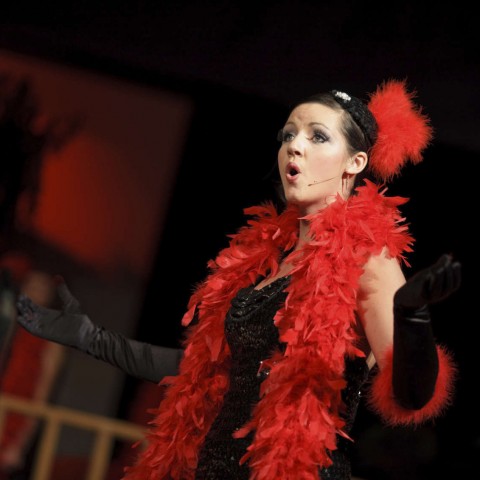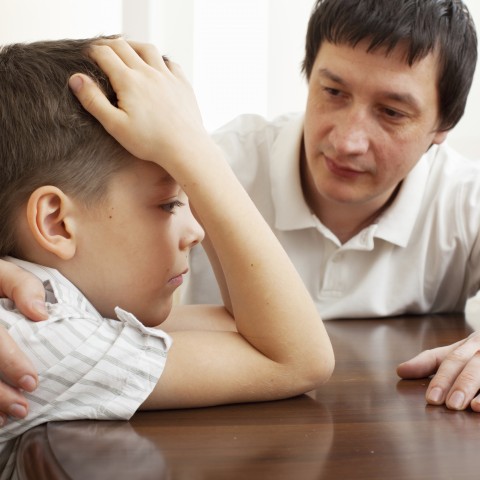
Conjugation enables you to speak and write English properly, in a way that other English-speakers will easily understand. It’s an essential aspect of the language, and learning how to properly conjugate verbs will fine-tune your English skills.
While you can technically use English without conjugation, it won’t sound very professional and will make communication more difficult.
In this article, you’ll learn all the basics of English verb conjugation so that you can make the most of every conversation!
 Table of Contents
Table of Contents
- What is Conjugation?
- Conjugation Examples
- Conjugating Irregular Verbs
- English Verb Conjugation Quiz
- Some Parting Words…
1. What is Conjugation?

Learning English conjugations can be difficult, but there’s a bit of good news for you: Verbs are the only part of speech that you conjugate!
Conjugation is how a verb changes to properly fit in a sentence. Each verb has an infinitive form, which is the most basic form of that verb (to think, to cry, to explain). But these infinitive verbs don’t work in all sentences, so they must be changed according to the following factors:
- Person (1st, 2nd, 3rd)
- Number (singular, plural)
- Tense (simple past, simple present, simple future)
- Aspect (simple, progressive, perfect)
In English, this is usually done by adding the most appropriate suffix: -ed (past participle) or -ing (present participle, also called a gerund).
Further, there are various subcategories of verb conjugations based on their tense and aspect. These subcategories are:
- Indicative: Indicative conjugation is done to imply a statement of a true thing that happened, is happening, or will happen.
- Subjunctive: Subjunctive conjugation is done to imply what one wishes had happened, or how a result might differ if that thing had happened.
- Conditional: Conditional conjugation is done to imply that something would happen or would have happened, in different circumstances.
- Imperative: Imperative conjugation is done to imply a command. Only the first person plural, second person singular, and second person plural forms use the imperative.
And because English verb conjugation is unnecessarily difficult and complex, these subcategories are further divided into the nominal form and the progressive/continuous form. The progressive/continuous form is easy to spot because the verb conjugations end in -ing.
Before you move on to the examples below, you may find it helpful to brush up on your English verb knowledge. Be sure to read the article I wrote on the topic, where I also explain the most basic conjugation.
2. Conjugation Examples

That was a lot to take in, so here I’ll include some examples using common English verbs. There’s a lot of information in the following English conjugation tables, so just take it easy and don’t expect to master these right away!
1- To walk
- Infinitive: To walk
- Participle: Walked
- Gerund: Walking

A. Nominal Form
| Indicative | ||||||
| Present | Simple past | Future | Perfect | Past perfect | Future perfect | |
| I | Walk | Walked | Will walk | Have walked | Had walked | Will have walked |
| You [s] | Walk | Walked | Will walk | Have walked | Had walked | Will have walked |
| He / She | Walks | Walked | Will walk | Have walked | Had walked | Will have walked |
| We | Walk | Walked | Will walk | Have walked | Had walked | Will have walked |
| You [p] | Walk | Walked | Will walk | Have walked | Had walked | Will have walked |
| They | Walk | Walked | Will walk | Have walked | Had walked | Will have walked |
| Subjunctive | ||||
| Present | Perfect | Imperfect | Past perfect | |
| I | Walk | Have walked | Walked | Had walked |
| You [s] | Walk | Have walked | Walked | Had walked |
| He / She | Walk | Have walked | Walked | Had walked |
| We | Walk | Have walked | Walked | Had walked |
| You [p] | Walk | Have walked | Walked | Had walked |
| They | Walk | Have walked | Walked | Had walked |
| Conditional | ||
| Present | Perfect | |
| I | Would walk | Would have walked |
| You [s] | Would walk | Would have walked |
| He / She | Would walk | Would have walked |
| We | Would walk | Would have walked |
| You [p] | Would walk | Would have walked |
| They | Would walk | Would have walked |
| Imperative – Present | |
| I | – |
| You [s] | Walk |
| He / She | – |
| We | Let’s walk |
| You [p] | Walk |
| They | – |
B. Progressive / Continuous Form
| Indicative | ||||||
| Present | Simple past | Future | Perfect | Past perfect | Future perfect | |
| I | Am walking | Was walking | Will be walking | Have been walking | Had been walking | Will have been walking |
| You [s] | Are walking | Were walking | Will be walking | Have been walking | Had been walking | Will have been walking |
| He / She | Are walking | Was walking | Will be walking | Have been walking | Had been walking | Will have been walking |
| We | Are walking | Were walking | Will be walking | Have been walking | Had been walking | Will have been walking |
| You [p] | Are walking | Were walking | Will be walking | Have been walking | Had been walking | Will have been walking |
| They | Are walking | Were walking | Will be walking | Have been walking | Had been walking | Will have been walking |
| Conditional | ||
| Present | Perfect | |
| I | Would be walking | Would have been walking |
| You [s] | Would be walking | Would have been walking |
| He / She | Would be walking | Would have been walking |
| We | Would be walking | Would have been walking |
| You [p] | Would be walking | Would have been walking |
| They | Would be walking | Would have been walking |
2- To listen
- Infinitive: To listen
- Participle: Listened
- Gerund: Listening
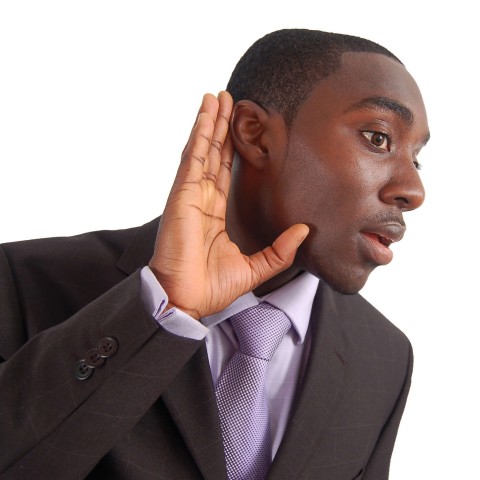
A. Nominal Form
| Indicative | ||||||
| Present | Simple past | Future | Perfect | Past perfect | Future perfect | |
| I | Listen | Listened | Will listen | Have listened | Had listened | Will have listened |
| You [s] | Listen | Listened | Will listen | Have listened | Had listened | Will have listened |
| He / She | Listen | Listened | Will listen | Have listened | Had listened | Will have listened |
| We | Listen | Listened | Will listen | Have listened | Had listened | Will have listened |
| You [p] | Listen | Listened | Will listen | Have listened | Had listened | Will have listened |
| They | Listen | Listened | Will listen | Have listened | Had listened | Will have listened |
| Subjunctive | ||||
| Present | Perfect | Imperfect | Past perfect | |
| I | Listen | Have listened | Listened | Had listened |
| You [s] | Listen | Have listened | Listened | Had listened |
| He / She | Listen | Have listened | Listened | Had listened |
| We | Listen | Have listened | Listened | Had listened |
| You [p] | Listen | Have listened | Listened | Had listened |
| They | Listen | Have listened | Listened | Had listened |
| Conditional | ||
| Present | Perfect | |
| I | Would listen | Would have listened |
| You [s] | Would listen | Would have listened |
| He / She | Would listen | Would have listened |
| We | Would listen | Would have listened |
| You [p] | Would listen | Would have listened |
| You [p] | Would listen | Would have listened |
| Imperative – Present | |
| I | – |
| You [s] | Listen |
| He / She | – |
| We | Let’s listen |
| You [p] | Listen |
| They | – |
B. Progressive / Continuous Form
| Indicative | ||||||
| Present | Simple past | Future | Perfect | Past perfect | Future perfect | |
| I | Am listening | Was listening | Will be listening | Have been listening | Had been listening | Will have been listening |
| You [s] | Are listening | Were listening | Will be listening | Have been listening | Had been listeningHad been listening | Will have been listening |
| He / She | Is listening | Was listening | Will be listening | Have been listening | Had been listening | Will have been listening |
| We | Are listening | Were listening | Will be listening | Have been listening | Had been listening | Will have been listening |
| You [p] | Are listening | Were listening | Will be listening | Have been listening | Had been listening | Will have been listening |
| They | Are listening | Were listening | Will be listening | Have been listening | Had been listening | Will have been listening |
| Conditional | ||
| Present | Perfect | |
| I | Would be listening | Would have been listening |
| You [s] | Would be listening | Would have been listening |
| He / She | Would be listening | Would have been listening |
| We | Would be listening | Would have been listening |
| You [p] | Would be listening | Would have been listening |
| They | Would be listening | Would have been listening |
3- To move
- Infinitive: To move
- Participle: Moved
- Gerund: Moving

A. Nominal Form
| Indicative | ||||||
| Present | Simple past | Future | Perfect | Past perfect | Future perfect | |
| I | Move | Moved | Will move | Have moved | Had moved | Will have moved |
| You [s] | Move | Moved | Will move | Have moved | Had moved | Will have moved |
| He / She | Moves | Moved | Will move | Has moved | Had moved | Will have moved |
| We | Move | Moved | Will move | Have moved | Had moved | Will have moved |
| You [p] | Move | Moved | Will move | Have moved | Had moved | Will have moved |
| They | Move | Moved | Will move | Have moved | Had moved | Will have moved |
| Subjunctive | ||||
| Present | Perfect | Imperfect | Past perfect | |
| I | Move | Have moved | Moved | Had moved |
| You [s] | Move | Have moved | Moved | Had moved |
| He / She | Move | Have moved | Moved | Had moved |
| We | Move | Have moved | Moved | Had moved |
| You [p] | Move | Have moved | Moved | Had moved |
| They | Move | Have moved | Moved | Had moved |
| Conditional | ||
| Present | Perfect | |
| I | Would move | Would have moved |
| You [s] | Would move | Would have moved |
| He / She | Would move | Would have moved |
| We | Would move | Would have moved |
| You [p] | Would move | Would have moved |
| They | Would move | Would have moved |
| Imperative – Present | |
| I | – |
| You [s] | Move |
| He / She | – |
| We | Let’s move |
| You [p] | Move |
| They | – |
B. Progressive / Continuous Form
| Indicative | ||||||
| Present | Simple past | Future | Perfect | Past perfect | Future perfect | |
| I | Am moving | Was moving | Will be moving | Have been moving | Had been moving | Will have been moving |
| You [s] | Are moving | Were moving | Will be moving | Have been moving | Had been moving | Will have been moving |
| He / She | Is moving | Was moving | Will be moving | Have been moving | Had been moving | Will have been moving |
| We | Are moving | Were moving | Will be moving | Have been moving | Had been moving | Will have been moving |
| You [p] | Are moving | Were moving | Will be moving | Have been moving | Had been moving | Will have been moving |
| They | Are moving | Were moving | Will be moving | Have been moving | Had been moving | Will have been moving |
| Conditional | ||
| Present | Perfect | |
| I | Would be moving | Would have been moving |
| You [s] | Would be moving | Would have been moving |
| He / She | Would be moving | Would have been moving |
| We | Would be moving | Would have been moving |
| You [p] | Would be moving | Would have been moving |
| They | Would be moving | Would have been moving |
3. Conjugating Irregular Verbs

In English, irregular verbs have conjugations that don’t follow the rules. Here are a few of the most common examples of irregular verbs with their conjugations. For this section, we’re not going to worry too much about the more complex conjugations that you saw above. I’ll keep this section simple by only including the verb tenses/aspects that are irregular.
Let’s start with the English conjugations of “to be.”
1- To Be
- Infinitive: To be
- Participle: Been
- Gerund: Being
| Indicative | Subjunctive | ||
| Present | Past | Imperfect | |
| I | Am | Was | Were |
| You [s] | Are | Were | Were |
| He / She | Is | Was | Were |
| We | Are | Were | Were |
| You [p] | Are | Were | Were |
| They | Are | Were | Were |
2- To Have
- Infinitive: To have
- Participle: Had
- Gerund: Having
| Indicative | Subjunctive | ||
| Present | Past | Imperfect | |
| I | Have | Had | Had |
| You [s] | Have | Had | Had |
| He / She | Has | Had | Had |
| We | Have | Had | Had |
| You [p] | Have | Had | Had |
| They | Have | Had | Had |
3- To Feel
- Infinitive: To feel
- Participle: Felt
- Gerund: Feeling
| Indicative | Subjunctive | |
| Past | Imperfect | |
| I | Felt | Felt |
| You [s] | Felt | Felt |
| He / She | Felt | Felt |
| We | Felt | Felt |
| You [p] | Felt | Felt |
| They | Felt | Felt |
4- To Eat
- Infinitive: To eat
- Participle: Eaten
- Gerund: Eating

| Indicative | Subjunctive | |
| Past | Imperfect | |
| I | Ate | Ate |
| You [s] | Ate | Ate |
| He / She | Ate | Ate |
| We | Ate | Ate |
| You [p] | Ate | Ate |
| They | Ate | Ate |
5- To Bite
- Infinitive: To bite
- Participle: Bitten
- Gerund: Biting
| Indicative | Subjunctive | |
| Past | Imperfect | |
| I | Bit | Bit |
| You [s] | Bit | Bit |
| He / She | Bit | Bit |
| We | Bit | Bit |
| You [p] | Bit | Bit |
| They | Bit | Bit |
6- To Sleep
- Infinitive: To sleep
- Participle: Slept
- Gerund: Sleeping
| Indicative | Subjunctive | |
| Past | Imperfect | |
| I | Slept | Slept |
| You [s] | Slept | Slept |
| He / She | Slept | Slept |
| We | Slept | Slept |
| You [p] | Slept | Slept |
| They | Slept | Slept |
7- To Tell
- Infinitive: To tell
- Participle: Told
- Gerund: Telling
| Indicative | Subjunctive | |
| Past | Imperfect | |
| I | Told | Told |
| You [s] | Told | Told |
| He / She | Told | Told |
| We | Told | Told |
| You [p] | Told | Told |
| They | Told | Told |
As you can see, the majority of these irregular verbs tend to repeat, making them easier to memorize. Further, most of them only conjugate irregularly in the past tense.
The downside is that these are only the beginning of irregular verbs. There are many more that you’ll have to memorize as you come across them. But you can do it!
4. English Verb Conjugation Quiz

Now, it’s time to test your knowledge. Don’t fret too much, though; this quiz will only focus on the simpler conjugations.
1) Bob [talk] with Dana yesterday.
Choices:
A) Talk
B) Talks
C) Talking
D) Talked
2) Phil [to be] in love with Valerie.
Choices:
A) Are
B) Is
C) Am
D) Were
3) Lily is [finish] her assignment right now.
Choices:
A) Finished
B) Finish
C) Finishing
D) Finishes
4) Mary always [act] like she [know] everything.
Choices:
A) Acts/knows
B) Acted/knows
C) Acted/knew
D) Acting/knows
5) I [eat] oatmeal with peanut butter this morning.
Choices:
A) Eaten
B) Eat
C) Eats
D) Ate
The correct answers are:
D – The word “yesterday” implies that the conversation happened the day before. Thus, the past tense conjugation is used.
B – Because Phil is a singular individual and currently in love, “is” is the most appropriate choice.
C – Lily is currently doing the action (indicated by the to be verb “is”), so the present form is used.
A – The word “always” implies that Mary currently does these things. Thus, the present form is used.
D – “Ate” is the past tense form of the word “eat,” and because the sentence doesn’t have a “to be” verb (to make it “I have eaten”), the correct conjugation must be “ate.”
5. Some Parting Words…
English verb conjugation is pretty terrible. But you’ve made it this far, and you’re going to make it even farther!

If the English verb conjugation charts in this article seem daunting to you, don’t worry—they’re daunting for native English-speakers too. Before you try learning all of this information, you may find it easier to learn the infinitive, participle, and gerund forms of verbs first. These forms play into the more complex ones, and from there, it’s as easy as plugging-and-chugging your way through.
For more information on this topic, be sure to check out more practical resources on EnglishClass101:
- 50 Most Common Verbs in English
- 10 Verbs not to Travel Without
- About English Verbs
- Learn English Grammar
Better yet, if you want to make a game out of learning conjugation, visit Verbix.com. Here, you can simply type in the infinitive form of any English verb, hit Enter, and see all of its different conjugations! Sometimes just playing around with new information can help you retain it better. 🙂
Before you go, let us know in the comments if you learned something new today! Do you feel more confident using English language conjugations? We hope that English conjugation is clearer to you now, and that you have a strong basis for future learning. Feel free to reach out with any questions, and we’ll do our best to answer them.
Until next time, happy learning!

Top 100+ Verbs in U.S. English: Ultimate Verb List & Guide

What is a verb, and why is it important to focus on learning them?
As for the most basic verb definition, verbs are commonly referred to as “action words,” because they’re words that name an action (though they sometimes refer to a state of being). Without verbs, people wouldn’t be able to talk about anything worthwhile or exciting. We use verbs all the time: While talking about our day, explaining directions or instructions, telling friends a story…and they’re used in both speech and writing.
So, what are the most common English verbs?
In this article, I’ll be going over the 100+ most common verbs in the English language. These are verbs that you can start using and practicing today, and that you’ll find yourself coming back to more times than you can count!
Before we get started on English language verbs, though, you may find the following articles useful:
Without further ado, here’s our list of all the verbs you need to know! 🙂
 Table of Contents
Table of Contents
- Verb Usage: How to Use English Verbs
- Top 100+ Verbs List
- How EnglishClass101 Can Help You Master the English Language
1. Verb Usage: How to Use English Verbs

There are three main components of verb usage to keep in mind before moving on to our list:
- Conjugation
- Agreement
- Basic sentence patterns
I’ll go into the basics of each one below.
1- Conjugation
Verb conjugation is how a verb’s tense is changed. You conjugate a verb by adding one of the following suffixes to the root verb:
- -s (or -es)
Adding the suffix -s to a verb changes it to the third person singular present form. For verbs that end with a sibilant sound and don’t have a silent “e,” use -es instead.
Win -> Wins
Box -> Boxes
Hike -> Hikes
This form means that a singular third party (he, she, or it) is currently doing something:
He wins again.
She boxes like a professional.
The dog hikes with its owner.
- -ing
Adding the suffix -ing to a verb changes it to the present participle form, which is also known as a gerund. For most verbs, you can simply add the suffix without making other changes: Peek -> Peeking.
But there are a few exceptions:
- If the verb ends in a silent “e,” you omit it before adding the -ing:
Waste -> Wast -> Wasting.
- If the verb ends in an “ie,” you replace it with the letter “y” before adding the -ing:
Tie -> Ty -> Tying.
- As for double consonants, rules vary: 1) If one vowel is followed by one consonant at the end of the word, that consonant is doubled. 2) If the verb ends in a “c”, you need to add a “k” after it, and then add the -ing:
1) War -> Warr -> Warring.
2) Mimic -> Mimick -> Mimicking.
- -ed
Adding the suffix -ed to a verb changes it to the past tense form. This means that the action happened in the past and is no longer happening.
- Keep in mind that if the verb already ends with an “e,” you only need to put the -d after it:
Wave -> Waved.
- If the verb instead ends with a consonant directly followed by a “y,” you need to change the “y” to an “ie” before adding the -d:
Apply -> Applie ->Applied.
- As for double consonants, rules vary, but these are fairly typical rules: 1) If one vowel is followed by one consonant at the end of the word, the consonant is doubled. 2) If the verb ends in a “c,” you need to add a “k” after it, and then the -ed. Keep in mind that there are exceptions to these rules, and the rules in U.S. English are different than those in British English.
1) Tap -> Tapp -> Tapped
2) Mimic -> Mimick -> Mimicked
There are also irregular ways to change the form of certain verbs. As English irregular verbs are a complicated topic with many variations, I won’t go into detail about them here. But whenever an irregular verb appears on our list of verb examples, I’ll make a note of it for you.
2- Subject-Verb Agreement
Now that you have a general idea of how to change the tense of verbs, let’s look at how they need to work in a sentence. Namely, the concept of subject-verb agreement.
According to the rule of subject-verb agreement, the subject and verb must agree in terms of number. This means that if a singular subject is performing an action, then the verb must also be singular. And if a plural subject is performing an action, then the verb must also be plural.
Here are some examples:
| Verb | Singular Sentence | Plural Sentence |
|---|---|---|
| Sleep Sleeping Slept *Note that the Past Tense of this verb isn’t “sleeped,” but slept. This is an irregular verb conjugation. | The man sleeps. The man is sleeping. The man slept. | The men sleep. The men are sleeping. The men slept. |
| Play Playing Played | The child plays. The child is playing. The child played. | The children play. The children are playing. The children played. |
| Arrive Arriving Arrived | The woman arrives. The woman is arriving. The woman arrived. | The women arrive. The women are arriving. The women arrived. |
As you can see from the verb examples above, there are different ways of changing the verb to match the subject in number.
- For the base verb: If the subject is singular, the verb is made singular by adding an -s. If the subject is plural, the verb doesn’t change as it already matches the number.
- For the Present Participle: The -ing verb itself remains the same for both singular and plural subjects, but a “be” verb is put directly in front of it. The appropriate “be” verb for the singular subject is is, and the appropriate “be” verb for the plural subject is are.
- For the Past Tense: Guess what? There’s no change at all here, as the -ed verb already matches both the singular and plural subject in number! 🙂
3- Basic Sentence Patterns + Examples
Every sentence in English requires a subject (S) and a verb (V). Most sentences follow the S + V pattern. Keep in mind that the verbs in this sentence pattern are intransitive, meaning that the actions don’t require an object to be a complete sentence.
I walk.
He talked.
She listens.
For more complex sentences, there’s also the sentence structure S + V + O, where O is the object to which or at which the action is being done. The verbs in this sentence structure are typically (but not always) transitive, meaning that an object is required to make the sentence complete.
I walked toward the bank.
He is talking to his teacher.
She looked at the ocean.
Further, a verb’s placement in a sentence can vary based on what type of sentence it is.
For instance, in an imperative sentence (a sentence that gives a command), the verb will most likely be at the beginning of the sentence: Bring me that mug.
There are also instances where the verb can be at the end of the sentence, though this isn’t very common: What to give?
2. Top 100+ Verbs List

We’ve compiled the best English verbs for beginners to learn, and divided them into easy-to-understand categories for you. These are English verbs used in daily life that you’ll hear over and over again. You really need to know these!
1- English Action Verbs List
Action verbs are the most common type of verb. These are verbs that describe a specific action, and there are two categories: Physical and Mental/Abstract.
Physical action verbs are things that you do outwardly with your body. Verbs that are mental/abstract typically refer to feelings, thoughts, or other types of doing or being that aren’t expressed through a specific bodily action.
Physical Verbs List
| Verb | Meaning | Example Sentence | Additional Notes | Irregular? |
|---|---|---|---|---|
| 1 Tell (Tells; Telling; Told) | To let someone know something, usually verbally. | I want to tell you something. | At some point, you may be asked the question “Can you tell?” People ask this when they aren’t sure about something, and are checking to see if you’re sure about it. For example, a coworker asks your friend to do something. Your friend later turns to you and says “I didn’t hear what she said. Could you tell?” You should know what they mean based on the context. | ✓ Note that the Past Tense form is “told,” NOT “telled.” |
| 2 Ask (Asks; Asking; Asked) | To inquire about something. | I want to ask you a question. | ||
| 3 Listen (Listens; Listening; Listened) | 3 Listen (Listens; Listening; Listened) | To hear and understand what someone is saying. To hear any noise. | ||
| 4 Yell (Yells; Yelling; Yelled) | To make a loud verbal noise, either with words or without. | Don’t yell in the house. | ||
| 5 Greet (Greets; Greeting; Greeted) | To interact with someone upon meeting them. | Joe didn’t know how to greet strangers. | ||
| 6 Wave (Waves; Waving; Waved) | To move your hand back and forth, either in greeting or to motion someone forward. | Why didn’t you wave at me in the store? | This isn’t to be confused with the noun “wave,” which refers to the ocean’s tides. | |
| 7 Move (Moves; Moving; Moved) | To make any type of motion. To relocate your place of residency. | Don’t move! Jill will move to Oregon in October. | ||
| 8 Go (Goes; Going; Gone; Went) | To leave your current place or position. | Why do you have to go to work? | ✓ Note that there are two past tenses for this word: the irregular “gone,” and the modern past tense “went.” | |
| 9 Stay (Stays; Staying; Stayed) | To remain where you are. | I don’t want to stay in this apartment forever. | ||
| 10 Wait (Waits; Waiting; Waited) | To anticipate something that will happen, and stay around for it. To serve someone. | I don’t think I can wait for my date any longer. I can’t wait on you your whole life! |

| Verb | Meaning | Example Sentence | Additional Notes | Irregular? |
|---|---|---|---|---|
| 11 Give (Gives; Giving; Gave) | To offer or provide something to someone else. | Can you give me more time to finish the assignment? | ✓ Can you give me more time to finish the assignment? | |
| 12 Take (Takes; Taking; Took) | To claim something as your own by reaching for it, or otherwise gaining it. | Don’t you dare take the last cookie! Take your time on the test. | In the second sentence, the word take is used a little bit differently. The phrase “take your time,” means not to hurry or go too fast when doing something. It’s sort of like “claiming” that time to use at your own pace. | ✓ Note that the Past Tense of this verb is “took,” NOT “taked.” |
| 13 Put (Puts; Putting; Put) | To place something in a certain spot. | Put down your pencils. | ✓ Note that the Past Tense of this verb is simply “put,” NOT “putted.” | |
| 14 Bring (Brings; Bringing; Brought) | 14 Bring (Brings; Bringing; Brought) | Will you bring me my book please? What can you bring to this project? | In the first sentence, Adam is asking someone to give him an item that is out of his reach. In the second sentence, the interviewer is asking what quality the job candidate can give to the project. Both words have the same meaning, but are used in different contexts. | ✓ Note that the Past Tense of this verb is “brought, ” NOT “bringed.” |
| 15 Get (Gets; Getting; Got) | To retrieve or attain something. | I hope you get the job. Did you get that? | There may be times when someone asks you the question “Do you get it?” This is usually a way of asking if you understand something, not if you actually attained an item. | ✓ Note that the Past Tense of this verb is “got,” NOT “getted,” |
| 16 Make (Makes; Making; Made) | To create or prepare something. | Can you make dinner tonight? | ✓ Note that the Past Tense of this verb is “made,” NOT maked.” | |
| 17 Look (Looks; Looking; Looked) | To see something, or turn to see something. | Look what I can do! | ||
| 18 Watch (Watches; Watching; Watched) | To observe something visually. | What shows do you like to watch on TV? | This is not to be confused with the noun “watch,” which refers to the time-telling device worn on the wrist. | |
| 19 Sit (Sits; Sitting; Sat) | To take a seat with your back straight and feet on the ground. | Sit up straight in your chair. | ✓ Note that the Past Tense of this verb is “sat,” NOT “sitted.” | |
| 20 Stand (Stands; Standing; Stood) | To be on your feet, supporting yourself vertically. | I need to stand up and walk around for a few minutes. | This is not to be confused with the noun “stand,” which refers to a vertical object used for holding something. | ✓ Note that the Past Tense of this verb is “stood,” NOT “standed.” |
| 21 Walk (Walks; Walking; Walked) | To travel by foot at a slow pace. | Will you walk with me? | This is not to be confused with the noun “walk,” which refers to a walkway or path. You may also hear someone say that they’re “going on a walk,” which just means that they’re going to walk for exercise. | |
| 22 Run (Runs; Running; Ran) | To travel by foot at a fast pace. | I’m tired; I can’t run any longer. | You may hear someone say that they’re “going on a run,” which just means that they’re going to run for exercise. | ✓ Note that the Past Tense for this verb is “ran,” NOT “runned.” |
| 23 Lift (Lifts; Lifting; Lifted) | To pick up something (usually heavy), especially from the ground. | Can you help me lift this box? | This is not to be confused with the noun “lift,” which refers to something (usually a machine) that lifts. |

| Verb | Meaning | Example Sentence | Additional Notes | Additional Notes |
|---|---|---|---|---|
| 24 Play (Plays; Playing; | To enjoy oneself through activities. | How about we play a game? | This is not to be confused with the noun “play,” which refers to a type of stage performance. | |
| 25 Stop (Stops; Stopping; Stopped) | To end or cease an action or activity. | Just stop bothering me already! | ||
| 26 Rest (Rests; Resting; Rested) | To take some time to stop an activity in order to regain energy. | I’m so tired. I need to rest. | You may hear someone say “Give it a rest!” This means that whatever you’re doing or saying is making them upset, and you should stop. | |
| 27 Sleep (Sleeps; Sleeping; Slept) | To lose waking consciousness and slumber. | You need to sleep before it gets too late. | ✓ Note that the Past Tense of this verb is “slept,” NOT “sleeped.” | |
| 28 Try (Tries; Trying; Tried) | To attempt to do something. | You won’t succeed if you don’t try. | ||
| 29 Work (Works; Working; Worked) | To do some type of labor or perform some task. | I appreciate that you work so hard. | This word is also used as a noun. For instance, someone may say “I’m going to work,” which means they’re going to their place of employment. | |
| 30 Study (Studies; Studying; Studied) | To make an effort toward learning, understanding, or memorizing something. | I really need to study for the test next week. | There are two other common uses of the word “study” as a noun. 1) When someone says that another person is a “quick study,” it means they learn quickly. 2) A study is also a type of room, usually containing books, writing utensils, and a desk. | |
| 31 Leave (Leaves; Leaving; Left) | To go away or depart. | I want to leave this town soon,. | There are a couple of common phrases in English that use this word as a noun: 1) “Go on leave” 2) “Take leave” Both refer to going on a vacation (or suspension) from a place of work or study. | ✓ Note that the Past Tense of this verb is “left,” NOT “leaved.” |
| 32 Drive (Drives; Driving; Drove; Driven) | To operate a vehicle or to bring something about. | I don’t want to drive at all after the car crash. You’re going to drive me crazy if you don’t stop. | The first sentence refers to operating a vehicle. The second sentence uses the word “drive” in the sense that the person Bill’s talking to will bring about his craziness. | ✓ Note that this verb has two past tense variations: the irregular “drove,” (he drove) and the past participle “driven,” (he has driven). |
| 33 Travel (Travels; Traveling; Traveled) | To visit new places. | I want to travel the world someday. |
| Verb | Meaning | Example Sentence | Additional Notes | Irregular? |
|---|---|---|---|---|
| 34 Arrive (Arrives; Arriving; Arrived) | To show up somewhere. | What time should he arrive for dinner? | ||
| 35 Clean (Cleans; Cleaning; Cleaned) | To tidy up or sanitize. | I really don’t want to clean the house right now. | ||
| 36 Eat (Eats; Eating; Ate) | To consume food. | I can’t wait to eat dinner tonight. | ✓ Note that the Past Tense of this verb is “ate,” NOT “eated.” | |
| 37 Drink (Drinks; Drinking; Drank; Drunk) | To consume liquid. | What would you like to drink? | “Drink” is also used as a noun to name something that a person can drink. For example, when used as a noun, the waitress could say: “What drink can I get you?” | ✓ Note that this verb has two past tenses: the irregular “drank,” (he drank the water) and the past participle “drunk,” (he has drunk the water). |
| 38 Turn (Turns; Turning; Turned) | To rotate or change direction; to change. | Turn right at the stop sign. How did my life turn into this? | In the first sentence,”turn” is used to indicate a change in direction. In the second sentence, it’s used to mean a change from one thing to another. | |
| 39 Buy (Buys; Buying; Bought) | To purchase something. | What do you think I should buy mom for Christmas? | ✓ Note that the Past Tense of this verb is “bought,” NOT “buyed.” | |
| 40 Laugh (Laughs; Laughing; Laughed) | To make a joyful noise that indicates something funny happened. | I love to hear you laugh. | ||
| 41 Cry (Cries; Crying; Cried) | To weep, usually associated with tears and sadness. | Please don’t cry. | ||
| 42 Smile (Smiles; Smiling; Smiled) | To curve your mouth upwards, usually when you’re happy. | Smile for the picture. | ||
| 43 Frown (Frowns; Frowning; Frowned) | To curve your mouth downward, usually when you’re sad. | I don’t like to see you frown like that. | P.S.: If someone tells you to “Turn your frown upside-down,” they want you to smile and be happy. 🙂 | |
| 44 Hug (Hugs; Hugging; Hugged) | To embrace someone by wrapping your arms around each other. | I need a hug. | ||
| 45 Kiss (Kisses; Kissing; Kissed) | To embrace someone (usually a significant other or family member) by pressing your lips against them. | Carla kissed her mother on the cheek before leaving. |

2. Mental/Abstract Verbs List
| Verb | Meaning | Example Sentence | Additional Notes | Irregular? |
|---|---|---|---|---|
| 46 Think (Thinks; Thinking; Thought) | To use one’s brain to formulate ideas. | Let me think about this first. | ✓ Note that the Past Tense of this verb is “thought,” NOT “thinked.” | |
| 47 Know (Knows; Knowing; Knew) | To understand something as fact and have knowledge of it. | I want to know what you’re thinking. | ✓ Note that the Past Tense of this verb is “knew,” NOT “knowed.” | |
| 48 Understand (Understands; Understanding; Understood) | To grasp the concept of something. | I don’t understand what’s going on. | ✓ Note that the Past Tense of this verb is “understood,” NOT “understanded.” | |
| 49 Comprehend (Comprehends; Comprehending; Comprehended) | To understand on a deep level. | Why is this problem so difficult to comprehend? | ||
| 50 Acknowledge (Acknowledges; Acknowledging; Acknowledged) | To accept something as true or as fact; to recognize. | I acknowledge the importance of this book. This is a problem we need to acknowledge. | ||
| 51 Accept (Accepts; Accepting; Accepted) | To agree to/with, | The teacher doesn’t accept this kind of behavior in the classroom. | ||
| 52 Believe (Believes; Believing; Believed) | To have faith or trust in a fact or concept. | I don’t believe what you’re telling me. | ||
| 53 Like (Likes; Liking; Liked) | To have a fondness for or toward something. | I like living in Washington. | ||
| 54 Love (Loves; Loving; Loved) | To care about someone or something; to have romantic or otherwise positive feelings toward someone or something. | I love my family. | Nowadays, people often use the words “like” and “love” interchangeably. But traditionally, “love” has a much stronger, more sincere connotation. | |
| 55 Admire (Admires; Admiring; Admired) | To have positive feelings of respect or love for someone; to watch or look at someone/something with such feelings. | I admire Mara for her courage. Admire this painting with me. |
| Verb | Meaning | Example Sentence | Additional Notes |
|---|---|---|---|
| 56 Care (Cares; Caring; Cared) | To sincerely take interest in the well-being of someone or something. | She really cares about Lionel. | |
| 57 Hate (Hates; Hating; Hated) | To greatly dislike something or someone, sometimes to the point of anger or disgust. | Tom hates Linda. | |
| 58 Learn (Learns; Learning; Learned) | To gain knowledge. | I want to learn how to speak another language. | |
| 59 Respect (Respects; Respecting; Respected) | To place due value upon another person (or thing). | Can’t you respect your grandparents a little more? | “Respect” is also used as a noun to embody the meaning of the verb. |
| 60 Honor (Honors; Honoring; Honored) | To respect; to uphold a certain moral standard or expectation. | You need to honor your parents’ wishes. Can I trust you to honor this rule? | You need to honor your parents’ wishes. Can I trust you to honor this rule? |
| 61 Calculate (Calculates; Calculating; Calculated) | To think something through in order to come to a conclusion or solution. | The accountant called back after calculating the numbers. | |
| 62 Wonder (Wonders; Wondering; Wondered) | To think about something, especially by asking yourself about it or going through possibilities. | I wonder if they’ll give me a discount on this dress. | “Wonder” is also used as a noun in two ways: 1) To embody the meaning of the verb. 2) To refer to something that is very good or fascinating. |
| 63 Expect (Expects; Expecting; Expected) | To believe that something will happen. | I expect that you’ll arrive on time. | |
| 64 Anticipate (Anticipates; Anticipating; Anticipated) | To foresee something. | I anticipate that the store will shut down soon. | |
| 65 Remember (Remembers; Remembering; Remembered) | To have memory of something; to recall something. | I wish I could remember our first date together. |

| Verb | Meaning | Example Sentence | Additional Notes |
|---|---|---|---|
| 66 Confuse (Confuses; Confusing; Confused) | To make someone unsure of something; to make a situation more difficult to understand. | To make someone unsure of something; to make a situation more difficult to understand. | |
| 67 Want (Wants; Wanting; Wanted) | To desire or long for something. | I want to eat a donut for breakfast. | |
| 68 Allow (Allows; Allowing; Allowed) | To give permission for something to happen; to have something happen under your watch. | I’ll allow you to eat a donut this one time. | |
| 69 Relax (Relaxes; Relaxing; Relaxed) | To rest without worry or stress. | I want you to relax. | |
| 70 Regret (Regrets; Regretting; Regretted) | To wish you had or had not done or said something. | I regret not joining the golf team in high school. |
2- Linking Verbs

Linking verbs are used specifically to link the subject (S) to a noun or adjective that renames the subject. For example, in the sentence “I feel tired,” the verb feel renames the subject “I” as “tired.” In other words, “I” = “tired.”
| Linking Verb | Meaning | Example Sentence | Additional Notes | Irregular? |
|---|---|---|---|---|
| 71 Look (Looks; Looking; Looked) | To appear to be a certain way. | Do I look okay in this outfit? | ||
| 72 Appear (Appears; Appearing; Appeared) | To become evident. | I appear to be losing some weight. | ||
| 73 Seem (Seems; Seeming; Seemed) | To look or appear to be a certain way. | Does Harold seem tense to you? | This isn’t to be confused with the noun “seam,” which has the same pronunciation. The meanings are entirely different. | |
| 74 Feel (Feels; Feeling; Felt) | Used to describe the experience of emotion, sensation, or a hunch. | I feel hopeful today. The table feels scratchy. I feel like the essay is too long. | ✓ Note that the Past Tense of this verb is “felt,” NOT “feeled.” | |
| 75 Smell (Smells; Smelling; Smelled) | Used to describe the experience of an aroma. | Used to describe the experience of an aroma. | ||
| 76 Taste (Tastes; Tasting; Tasted) | Used to describe the experiencing of a taste. | I hope it tastes good, too. | ||
| 77 Sound (Sounds; Sounding; Sounded) | Used to describe the experience of noise; used to describe someone’s thoughts on what they heard. | It sounds like a carnival in here. It sounds like Anya plans on leaving the company soon. | ||
| 78 Act (Acts; Acting; Acted) | Used to describe the state in which a person appears to be in. | He acts like he owns the place. | ||
| 79 Resemble (Resembles; Resembling; Resembled) | To appear to be like another thing in some way. | To appear to be like another thing in some way. | ||
| 80 Remain (Remains; Remaining; Remained) | To continue to be a certain way or in a certain state. | Can things remain the way they are? | This isn’t to be confused with the noun “remains,” which refers to something that’s left over. | |
| 81 Become (Becomes; Becoming; Became) | To change state. | A caterpillar becomes a butterfly. | ✓ Note that the Past Tense of this verb is “became,” NOT “becomed.” |
3- Helping Verbs
Helping verbs in English can be a bit complicated, but luckily, there aren’t very many of them. There are two types of helping verbs:
- Modal: Modal verbs imply that something is possible, impossible, certain, or probable. Oftentimes, modal verbs imply ability, permission, a request, or an offer of some sort.
- Auxiliary: Auxiliary verbs add additional information to a sentence.
English Modal Verbs Table

| Modal Verb | Meaning | Example Sentence | Additional Notes |
|---|---|---|---|
| 82 Can | This implies the ability of someone/something to do an action. | I can walk on my hands for thirty minutes. | |
| 83 May | This implies permission to do something, or the possibility of something happening. | May I go to the store with you? I may buy ice cream later. | |
| 84 Must | This implies that something needs to happen, usually so that something else can happen. | You must get at least a 70 to pass the test. | |
| 85 Will | This implies that something is going to happen, or that someone is going to do something. | I will call you back later. | |
| 86 Could | This implies the ability of something to perform an action (or be used for that action). | Could that hairpin be used as a key? | |
| 87 Would | This implies that an action would be performed if the possibility existed. | I would help you if I could. | |
| 88 Should | This implies whether an action or event is necessary or a good idea. | Should we really eat chocolate chips after dinner? | |
| 89 Shall | This means the same thing as “will.” | I shall own this kingdom one day. | Note that the word “shall” tends to sound a little bit pretentious in modern speech. In general, it’s better to use the word “will,” especially in casual conversation. |
| 90 Might | This implies that there’s a possibility that something will happen. | I might have to leave a few minutes early. |
English Auxiliary Verbs Table
| Auxiliary Verb | Meaning | Example Sentence | Additional Notes |
|---|---|---|---|
| 91 Be (Is; Being; Was) | To exist or have a certain quality. | There’s no need to be rude about it. | |
| 92 Do (Does; Doing; Did) | To perform an action. | What is he doing? | |
| 93 Have (Has; Having; Had) | For something to be necessary or inevitable; to possess something; to experience something. | He has to make his mind up sometime. I have a PS3. I had a hard time last week. |
4- Bonus: Verb Phrases
In English, there are many verb phrases that we use to specify a more specific action. A verb phrase is usually two words that describe a single action. Here are some of the most common ones that you’re likely to hear in daily life:
| Verb Phrase | Meaning | Example Sentence | Additional Notes |
|---|---|---|---|
| 94 Wake up | To stop sleeping. | It’s time to wake up. | |
| 95 Give up | To lose hope and stop trying. | You’ve come so far; don’t give up yet. | |
| 96 Pick up | To take something in your hands; to retrieve something; to gain knowledge of something. | Can you pick up your toys off the floor? I forgot to pick up rice at the store last weekend. I was able to pick up some job-searching advice on the retreat. | This may be the most complicated verb phrase in English, as it has three potential meanings. The more you practice English, the easier it will be to know which meaning is relevant based on the context. |
| 97 Brighten up | To become happier or more joyful; to be the reason for someone else becoming happier. | Kierra brightened up when she saw Ian. Ian really knows how to brighten up a room. | |
| 98 Shy away | To neglect to do something because of fear or embarrassment. | I didn’t mean to shy away from that job opportunity. | |
| 99 Take away | To take something from another person; to gain information or value from something. | Do I have to take away your phone? I took away some good information from the lecture. | |
| 100 Give away | To give something you own to someone else; to reveal a secret. | I want to give away some of my old clothes soon. I won’t give away the ending of the book. | |
| 101 Throw away | To put something in the trash; to figuratively do so to something good in one’s life. | Don’t throw away the leftovers! Why did you throw away that good relationship you had? | |
| 102 Waste away | To diminish over time. | I hate to see that old house just waste away. | |
| 103 Sleep in | To sleep until late in the morning (or later than one usually wakes up). | I really can’t wait to sleep in on Saturday. | |
| 104 Head out | To leave, usually for a specific place. | I’m going to head out now. | |
| 105 Drop off | To leave something (or someone) at a certain place or with a certain person. | The school bus dropped off the girl at her bus stop. |

3. How EnglishClass101 Can Help You Master the English Language
Okay, breathe out now. Unclench your fists. Leave the room to cry for a few minutes, if you need to. It’s over now. That’s all the detail I’ll be going into in this English verbs guide.
If you made it this far, I’m impressed. Verbs may just be the most difficult, spirit-crushing part of the English sentence, and you just read all about them.
Don’t expect to be a master overnight; students in the United States start learning this stuff early on, up until the end of high school—and they still get some of this conjugation/tense stuff wrong. Really, irregular verbs are a nightmare.
I recommend visiting this page often, or even printing it out to have a handy verb reference with you to study. And, as with anything you want to be truly good at, you need to practice using these verbs often! Some verbs may come easier than others, but with enough time and practice, you’ll be able to use everything in this verbs list like it’s nothing!
Know that EnglishClass101.com wants to help you out on each step of your language-learning journey. We offer constant support, effective learning tools, and a fun approach to English-learning that we think you’ll love! (Well, as much as you can love learning an often-frustrating language.)
Before you go, let us know in the comments how you feel about English verbs. Do you feel like you have a better idea of how they work, or is there something you’re still not understanding? Are there any important verbs we missed? We look forward to hearing from you!

Pronouns in English: The Ultimate Pronoun List & Guide

Cathy bought Ben & Jerry’s ice cream because Cathy couldn’t find Dreyer’s.
Cathy’s name is used two times in this sentence, causing it to drone on. If I were to use a pronoun instead of her name the second time, it would sound much better:
Cathy bought Ben & Jerry’s ice cream because she couldn’t find Dreyer’s.

So, what is a pronoun? Here’s a pretty simple definition:
Pronouns allow you to mention the same noun in a sentence multiple times, without repeating the same word (which will begin to sound dull and redundant).
There are several types of pronouns in English, which I’ll explain in this article with pronoun examples. These words will make your speech and writing seem more fluent and natural, so trust me when I say that taking the time to learn them well is a must!
Before getting started with this English pronouns lesson, I suggest you take a look at this condensed Pronoun Vocabulary List, which includes cute images and pronunciation examples. 🙂
It’s okay if you need to take a couple of breaks along the way. Take some deep breaths and know that you can do this. You’ll be glad you did.
 Table of Contents
Table of Contents
- Personal Pronouns
- Demonstrative Pronouns
- Interrogative Pronouns
- Indefinite Pronouns
- Relative Pronouns
- Reciprocal Pronouns
- Conclusion: How EnglishClass101 Can Help You Learn More English!
1. Personal Pronouns

The most common type of pronoun is the personal pronoun. Underneath the umbrella of personal pronouns, there are:
- Subject pronouns
- Object pronouns
- Possessive pronouns
- Reflexive & intensive pronouns
Each of these personal pronouns serve a different function in a clause or sentence, which I’ll explain below.
1- Subject Pronouns
A subject pronoun is the subject of a sentence. This is the pronoun that performs an action, and there are both singular and plural forms.
Note that each of the words in the following English personal pronouns list performs an action (which is italicized) in the examples.

| Singular | Plural |
|---|---|
| I Meaning: Refers to a singular person speaking. Example Sentence: I spent time with my family yesterday. | We Meaning: Refers to a group of people that includes you. Example Sentence: We went to Mt. St. Helens and the mall. |
| You Meaning: Refers to an individual you’re speaking to. Example Sentence: You are reading this article. | You Meaning: Refers to a group of people whom you’re speaking to. Example Sentence: “You really bought this for me?” Tom asked his friends. |
| He Meaning: Refers to a specified masculine individual. Example Sentence: He had to go to the bank last week. | They Meaning: Refers to a group of people that doesn’t include you. This is a gender-neutral pronoun. Example Sentence: They had no idea what to do. |
| She Meaning: Refers to a specified feminine individual. Example Sentence: She hasn’t come home yet. | |
| It Meaning: Refers to a single, gender-neutral subject, usually an object or animal. Example Sentence: It ran away. |
You may have noticed that there are no plural forms for the pronouns “He,” “She,” or “It.” While these pronouns are masculine, feminine, and gender-neutral, respectively, they can all be grouped under the gender-neutral plural pronoun “They.”
Take for example the sentence: “They had no idea what to do.”
We have no idea who (or what) they are, or what their gender is. This could be a group of men, a group of women, a group of both men and women, or even a group of animals. “They” can be used for a couple or a group of anything, regardless of type or gender.
It is worth noting that “they” also sees use as a gender-neutral singular pronoun — both to refer to nonspecific people (“The doctor said they didn’t know what to do”) and as a preferred pronoun for specific people. Using the pronoun “it” can sound dehumanizing, so many prefer to use “they” as a gender-neutral pronoun when referring to people. Be careful, though — while its use is quite common in casual language, academics and style guides are still divided on whether the singular “they” is acceptable in formal language.
2- Object Pronouns
Object pronouns are those on the receiving end of a verb, and are typically used after the verb in a sentence or clause.
Notice that two of these words are identical to those from the previous section: “You” and “it.” These words do not change form, whether they’re the subject or the object.
| Singular | Plural |
|---|---|
| Me Meaning: Refers to you as the speaker. It’s the object pronoun version of “I.” Example Sentence: My boyfriend bought chocolate for me. Additional Notes: Here, “me” is the object pronoun because the chocolate was bought for this person (this person isn’t the one buying it). | Us Meaning: Refers to a group of people that includes you. This is the object pronoun version of “we.” Example Sentence: Valerie always seems to get us lost. Additional Notes: Here, “us” is the object pronoun because the group, including the speaker, is lost due to Valerie (they don’t get themselves lost). |
| You Meaning: Refers to an individual you’re talking to, when they receive or are affected by an action. Example Sentence: Your friends looked everywhere and couldn’t find you. Additional Notes: Here, “you” is the object pronoun because this person is being looked for (and not looking for someone). | You Meaning: Refers to a group of people whom you’re speaking to when they receive or are affected by an action. Example Sentence: We tried to wait for you all! Additional Note: In the above sentence, the pronoun “you” is followed by the word “all,” to show that it’s a plural “you.” But more often than not, the word “all” will be omitted, as it’ll be clear a group is being spoken to. Fun Fact: In some areas of the United States, particularly the southwest, people say y’all (a contraction of “you all”) and all y’all (“all of you all”). |
| Him Meaning: Refers to a masculine individual. This is the object pronoun version of “he.” Example Sentence: Sylvia showed him the movie. Additional Notes: Here, “him” is the object pronoun because 1) the person is male, and 2) the person is being shown something (not showing someone something). | Them Meaning: Refers to a group of people that doesn’t include you. This is a gender-neutral pronoun, and is the object pronoun version of “they.” Example Sentence: Sharla decided to go with them. Additional Notes: Here, “them” is the object pronoun because the group has someone going with them. |
| Her Meaning: Refers to a feminine individual. This is the object pronoun version of “she.” Example Sentence: Tom didn’t know what to buy her. Additional Notes: Here, “her” is the object pronoun because 1) the person is female, 2) and she is going to be receiving something (not the one who is going to buy something). | |
| It Meaning: This refers to a gender-neutral object Example Sentence: Nate saw the dog and petted it. Additional Notes: Here, “it” is the object pronoun because 1) the noun is gender-neutral, and 2) the dog is receiving the pet (and not petting something itself). |

In each of the example sentences above, the underlined word is the object pronoun, and the italicized word is the verb or action being done to it.
3- Possessive Pronouns
Next on our English pronouns list are possessive pronouns.
Possessive pronouns are used to show who owns something or who something belongs to. Possessive pronouns are also used as adjectives. This may sound confusing, but it really isn’t too hard!
As you look at the chart below, be sure to study the structure associated with possessive pronouns vs. possessive adjectives.
| As a Pronoun — noun + be verb + possessive pronoun | As an Adjective — possessive pronoun + noun |
| Mine Meaning: Used when something belongs to you, the speaker. Example Sentence: Victory is mine. Additional Note: Be sure not to confuse this with the noun “mine” (referring to a place where something is dug up) or the verb “mine” (the act of digging). It’s entirely different in meaning. | My Meaning: Used when something belongs to you, the speaker. Example Sentence: That’s my umbrella. |
| Ours Meaning: Used when something belongs to a group that includes you. Example Sentence: This problem is ours. | Our Meaning: Used when something belongs to a group that includes you. Example Sentence: This is our house. |
| Yours Meaning: Used when something belongs to an individual you’re talking to. Example Sentence: That money is yours. | Your Meaning: Used when something belongs to an individual you’re talking to. Example Sentence: Is this your laptop? |
| His Meaning: Used when something belongs to a male individual. Example Sentence: That book is his. | His Meaning: Used when something belongs to a male individual. Example Sentence: That’s his dog. |
| Hers Meaning: Used when something belongs to a female individual. Example Sentence: The toolbox is hers. | Her Meaning: Used when something belongs to a female individual. Example Sentence: I don’t like her attitude. |
| Theirs Meaning: Used when something belongs to a group of people not including you. Example Sentence: They said that the car is theirs. | Their Used when something belongs to a group of people not including you. Example Sentence: It was their idea! |
4- Reflexive & Intensive Pronouns
Both reflexive and intensive pronouns end with the suffix -self (singular) or -selves (plural). However, they are used differently.
Before going into detail about how to use them, here’s a chart showing the singular and plural forms of each reflexive and intensive pronouns. There are three things you should note:
1) The forms for reflexive and intensive pronouns are identical when both singular and plural.
2) Only three pronouns have a plural form, which are “Your,” “Them,” and “Our.”
3) The pronoun “Our” can technically be used in singular form, though this is considered incorrect by some.
| My | Your | Him | Her | It | Them | Our | |
| Singular | Myself | Yourself | Himself | Herself | Itself | Themself | Ourself |
| Plural | XXX | Yourselves | XXX | XXX | XXX | Themselves | Ourselves |
So, what’s the difference between reflexive and intensive pronouns?
The biggest difference is that reflexive pronouns can’t be removed from the sentence and are necessary for the sentence to be correct. Intensive pronouns can be removed, and the sentence will still be correct.
Here’s a chart to better explain this (note that I omitted the singular “Ourself” as this is generally incorrect):
| Myself | Yourself Yourselves | Himself | Herself | Itself | Themselves | Ourselves | |
|---|---|---|---|---|---|---|---|
| Reflexive | I’m all by myself. | You should love yourself. You should be ashamed of yourselves! | He cares about no one but himself. | She treated herself to ice cream. | The table moved all by itself! | They can let themselves into the house. | We hate ourselves for what we did. |
| Intensive | I corralled the horses all by myself. | Did you make that yourself? Are you, yourselves, going to the dance? | He wanted to escort her himself. | She prepared everything herself. | The only thing to fear is fear itself. | Did they do that themselves? | We paid for the bike ourselves. |
Note that each of the example sentences using reflexive pronouns would make no sense if you took away the reflexive pronouns, whereas the intensive pronoun sentences would still completely make sense even without the intensive pronouns.
2. Demonstrative Pronouns
Demonstrative pronouns are pronouns that replace the antecedent noun in a sentence. Further, a demonstrative pronoun is one that demonstrates a noun, similar to what a person does through pointing or motioning in body language, but with words. For example, you can imagine someone pointing to something while saying “those.”

| Meaning | Example Sentence | Additional Notes | |
|---|---|---|---|
| This [Singular] | “This” refers to something that’s nearby, or to the exact thing that one is experiencing. | I can’t stand this traffic! | “This” is used here because the word it references (traffic) is singular and is being experienced at that exact moment and place. |
| That [Singular] | “That” usually refers to something farther away, like something you would point at. | That strawberry looks funny. | “That” is used here because the word it references (strawberry) is singular and is likely being pointed to or otherwise indicated. |
| These [Plural] | “These” is the plural form of “this.” | These bananas look good. | “These” is used here because the word it references (bananas) is plural and is likely nearby (e.g. being held or directly looked at). |
| Those [Plural] | “Those” is the plural form of “that.” | Look at those bananas over there. | “Those” is used here because the word it references (bananas) is plural and likely farther away, being pointed to or otherwise indicated. |
| Here | “Here” is the equivalent of “this,” but relates only to location. | Here is the money I owe you. | “Here” is used in this sentence because the person likely has the money in-hand, and is, at that moment, giving it to the other person. |
| There | “There” is the equivalent of “that,” but relates only to location. | You can see the bank over there. | “There” is used because the bank is probably in the distance, being pointed to or indicated. |
3. Interrogative Pronouns

Interrogative pronouns are used when asking a question, and are probably the easiest pronouns you’ll deal with for this reason. There are four basic interrogative pronouns: “What,” “Which,” “Who,” and “Where.” Note that “Who” can also change to “Whom” or “Whose” depending on the question being asked; I’ll go more into this later.
For now, here’s an English pronouns chart that shows these interrogative pronouns in action!
| Meaning | Example Sentence | Additional Notes | |
|---|---|---|---|
| What | “What” is typically used when asking for clarification on something. | What did she say? | “What” is used here because the speaker wants clarification on what the woman said. |
| Which | “Which” is typically used when asking for someone to distinguish between two or more people/things. | Which dress looks better on me? | “Which” is used here because the speaker wants the listener to tell her, out of all the dresses, which one looks best on her. |
| Who / Whom / Whose | The “Who” words are all used when asking specifically about a person. | Who is that over there? To whom should I address the letter? Whose backpack is this? | |
| Where | “Where” is used when asking about direction or location. | Where did I park the car? | “Where” is used here because the speaker is asking about the location of their car. |
Now, as promised, here’s information on the difference between who, whom, and whose.
Who is used when the person being asked about is the main subject.
Whom is used when the person being asked about is the one receiving (or who will receive) an action. In the example sentence, note the article “to” before the word whom. This indicates that something will happen to or be given to the person being asked about.
Whose is used when the question is about possession. Whose backpack, whose shirt, whose vehicle, etc. This is not to be confused with the conjunction “who’s,” which means “who is.”
4. Indefinite Pronouns
Indefinite pronouns are used when there’s no need to be specific. For example, if you’re talking about a group of people in your office who all play golf, you could say “everyone in my office plays golf.” Or when you need to know what time it is and don’t really care who gives you the time, you could ask “Can anyone tell me the time?”

Here’s a breakdown of how these words are created.
| -one | -body | -where | -thing | |
|---|---|---|---|---|
| Every | Everyone | Everybody | Everywhere | Everything |
| Some | Someone | Somebody | Somewhere | Something |
| No | No one | Nobody | Nowhere | Nothing |
| Any | Anyone | Anybody | Anywhere | Anything |
Note that the prefixes are always “every-,” “some-,” “no-,” or “any-,” depending on what you’re trying to say.
And the suffixes are always “-one,” “-body,” “-where,” or “-thing.”
In the chart below, I’ve categorized the indefinite pronouns by their suffix.
| Meaning | Example Sentence | Additional Notes | |
|---|---|---|---|
| Everyone | “Everyone” refers to each person in a specified group of people. | Everyone ignored the new girl at school. | Each person at the school ignored the new girl. |
| Someone | “Someone” refers to one individual in a group of people, specified or unspecified. | Someone stopped to help the old lady cross the street. | An individual helped an old lady. |
| No one | “No one” means that no individual in a group of people is included. Another translation could be “not a single person.” | No one is perfect. | There’s not a single person who’s perfect. |
| Anyone | “Anyone” refers to an unspecified individual in a group of people. | “Is anyone here?” she asked. | She wants to know if there’s a person there; she doesn’t really care who. |
| Everybody | “Everybody” has the same meaning as “everyone.” | “Could everybody please be quiet?” Stan yelled. | Stan wants each person around him to be quiet. |
| Somebody | “Somebody” has the same meaning as “someone.” | Somebody knocked on the door. | An unknown individual knocked on the door. |
| Nobody | “Nobody” has the same meaning as “no one.” | “Nobody move!” he said. | He doesn’t want a single person to move. |
| Anybody | “Anybody” has the same meaning as “anyone.” | Does anybody have some spare change? | The speaker is asking if any person has change. |
| Everywhere | “Everywhere” refers to each place or area, none excluded. | “I looked for it everywhere, and can’t find it,” Sue said. | Sue has *supposedly* looked in each possible place for what she’s looking for. |
| Somewhere | “Somewhere” refers to an individual place. | “I just need to go away somewhere,” he said. | He needs to go away, to an unspecified place (meaning he doesn’t really know where or doesn’t want to say). |
| Nowhere | “Nowhere” could also be “not a single place.” | “Nowhere” could also be “not a single place.” | Not a single place is quiet enough for the speaker. |
| Anywhere | “Anywhere” refers to an unspecified place. | I don’t want to go anywhere right now. | The speaker doesn’t care where the place is, they just don’t want to go. |
| Everything | “Everything” refers to each one of something, or all of something. | Some days, everything seems to go wrong. | Some days, each possible thing will go wrong. |
| Something | “Something” refers to an individual thing. | “There’s something odd about that man,” they whispered. | They think that the man is odd for some unspecified reason. |
| Nothing | “Nothing” could also be “not a single thing.” | Nothing would make me happier right now than some food. | Not a single thing will make the speaker as happy as food will. |
| Anything | “Anything” refers to an unspecified thing. | “Is there anything else I can get you?” the waiter asked. | The waiter doesn’t care what’s needed, but if the person he’s speaking to needs something, he’ll get it. |
5. Relative Pronouns
Relative pronouns connect a relative clause to an independent clause. In other words, they relate the noun to the noun’s significance.
There are five relative pronouns: “Which,” “That,” “Who,” “Whom,” and “Whose.”
| Meaning | Example Sentence | Additional Notes | |
|---|---|---|---|
| Which | “Which” is used in nonrestrictive clauses, meaning that the noun it precedes is not limited to only that thing. Typically, it’s used to add information to that noun in terms of the rest of the clause. | It was her love which set him free. | Here, “which” is used because it’s explaining what her love did. It added information. |
| That | “That” is used in restrictive clauses, meaning that the noun it indicates is specific and limited to only that thing. | I see the dog that we wanted to adopt. | Here, “that” is used because the person is talking about a specific dog they wanted to adopt. The speaker isn’t talking about any other dog, only this one. |
| Who | “Who” is used when talking about a specific person as the subject of a sentence (the one who did or is doing something). | That’s the woman who stole your inheritance! | |
| Whom | “Whom” is used when the person being talked about is the object of an action, or was affected by an action. | Is that the man whom you dated? | |
| Whose | “Whose” is used when specifying the person who owns something. | Isn’t she the one whose house caught on fire? |
6. Reciprocal Pronouns
Reciprocal pronouns are used when two (or more) nouns are being replaced at once, usually when both are performing an action in terms of the other person. There are only two of these pronouns: “each other” and “one another.”
- Each other
- Bob and Joe hit each other.

- One another
- “Why can’t you get along with one another?” their mother asked.
- Note that “you” here is used in its plural form, as the mother is talking to both of her children.
And that’s all there is to it!
7. Conclusion: How EnglishClass101 Can Help You Learn More English!

Pronouns are one of the most difficult aspects of English for those seeking to learn the language—it’s even difficult for native English-speakers!
Once you learn the English pronouns rules, their patterns, and the similarities between different English pronouns and their uses, they will become much easier. I promise! And don’t fret if you mess up sometimes. As long as you’re aware of your errors and keep striving to be better, you’re on the right track.
Now that you’ve reached the end, reward yourself with your favorite treat or activity. You’ve more than earned it! 😉
If you found this article helpful and want to keep up with our study and learning materials, create a free EnglishClass101.com account! Read more insightful blog posts like this one, study our free English vocabulary lists on a variety of topics, and download our mobile apps that are designed to let you study anywhere on your own time! By upgrading to a Premium Plus account, you can also take advantage of our MyTeacher program, and learn English one-on-one with your own teacher and personalized plan. It’s our goal to make English-learning both fun and informative!
Before you go, let us know in the comments how you feel about English pronouns now. Did our pronoun list help you at all? It’s a lot to take in, so let us know if there’s anything you’re struggling with. We look forward to hearing from you!

Your Guide to Basic English Sentence Structures & Word Order

Word order and sentence structure are essential for any language-learner. They can determine the meaning of a sentence, help you emphasize certain aspects of the sentence, and allow your speech and writing to sound more natural.
In this article, I’ll guide you through the following two topics:
- Correct sentence structure in English
- English word order rules
I’ll also provide you with several English word order examples along the way, so you can see how it all works together.
Once you understand the most basic English sentence structures, you’ll be a much more effective communicator. Before we continue, you may find it helpful to take a look at our English grammar page and familiarize yourself with some of the topics I’ll cover.
Let’s get started!
 Table of Contents
Table of Contents
- Overview of Word Order in English
- Basic Sentence Structure Rules
- Let’s Add Prepositional Phrases
- And Now Modifiers
- Sentence Transformations!
- Final Thoughts
1. Overview of Word Order in English

What is the order of an English sentence?
Overall, the sentence structures in English are very flexible. Which structure you use depends on context and personal preference, although Subject + Verb + Object (SVO) is the most common structure. For example:
“I pet the cat.“
It’s also possible to form very simple sentences with only the subject and verb as long as they form a complete thought (SV):
“He ran.“
That said, there are four types of sentence structures that are commonly used in English.
1- The Four Types of Sentence Structures
Before we go any further, you need to know the difference between dependent and independent clauses.
1. Dependent vs. Independent
Dependent:
A dependent clause is one that requires an independent clause to be a complete sentence. Dependent clauses do not contain enough information (a subject, verb, and complete idea) to be a sentence. An example would be the clause “Since Kaitlyn didn’t come.”
This clause leaves the listener wanting more information. What was the result of Kaitlyn not coming?
Independent:
An independent clause is one that can be used by itself and contains all the information it needs to be complete. An example would be the clause “I felt lonely.”
Although we don’t have tons of information available to us, the above clause represents a complete idea. It has a subject (I), a verb (felt), and a word that adds necessary information to the verb (lonely).
Putting Them Together:

Remember how I said that a dependent clause needs an independent clause to be complete? Check this out:
“Since Kaitlyn didn’t come, I felt lonely.”
Now we have an answer to what was previously a dependent clause. And now we have even added more information to the already-completed independent clause. It’s a win-win!
2. What are Four Types of Sentence Structures?
There are four basic English sentence structure types (simple, compound, complex, compound-complex). We’ve outlined them below.
| Definition | Examples | |
|---|---|---|
| Simple | Requires a subject and a verb. Consists of one independent clause. Sometimes it has an object as well. | “I worked.” OR “I worked on the book.” He proposed. OR “He proposed to her.” “She smiled.” OR “She smiled at him.” |
| Compound | Consists of two (or more) independent clauses. The independent clauses are usually connected by a linking word or phrase (as shown in these examples), a semicolon, or a colon. | “I worked, and then I made dinner.” “He proposed, and she said yes.” “She smiled and (she) took his hand.” |
| Complex | Consists of one independent clause and one dependent clause. | “I worked, even though I was tired.“ “Though nervous, he proposed.“ “Because she smiled, he was happy.“ |
| Compound-Complex | Consists of two independent clauses and one dependent clause. | “I worked, even though I was tired, and then I made dinner.“ “Though nervous, he proposed, and she said yes.“ “Because she smiled, he was happy; then she took his hand.“ |
This is just an overview. In the following sections, I’ll go into more detail about how these sentence transformations work, starting with the basics of word order in English.
2. Basic Sentence Structure Rules

As mentioned earlier, in English, you only need two words to create a whole sentence: The subject (S) and the verb (V). This is the SV sentence structure.
“Sarah writes.“
You can add more information to this simple sentence by adding an object (O) to the end. This becomes the SVO sentence structure.
“Sarah writes poetry.“
The SV and SVO sentence structures are the most common structures in the United States. The only real exception is when people are giving a command or asking a question. In this case, they may be able to get away with using one word or an incomplete thought:
- “Peter!” (S)
- “Stop!” (V)
- “The book!” (O)
- “Why?” (Question)
In the cases above, the context will help you determine the meaning.
In all other situations, it’s most proper to use the SV or SVO structure (unless you want to talk like Yoda with OSV).
3. Let’s Add Prepositional Phrases

1- The Basics
What happens to a sentence when you add a prepositional phrase? What does that look like?
A prepositional phrase adds information to simple sentences. Often, it answers the questions of where, when, how, and why something happened.
Here are four examples of prepositional phrases:
- In the park (Where)
“Sarah writes poetry in the park.”
- At night (When)
“Sarah writes poetry at night.”
- By herself (How)
“Sarah writes poetry by herself.”
- Because it’s fun (Why)
“Sarah writes poetry because it’s fun.”
2- Position in a Sentence

In the above examples, the prepositional phrases are at the end of the sentence. But, a prepositional phrase can also come at the beginning of a sentence, although this is less common. The order you choose depends on what you want to emphasize in your sentence.
For example, if you want to emphasize what time Sarah writes poetry, you could say:
“At night, Sarah writes poetry.“
This indicates when Sarah chooses to write. It also suggests that when she writes is more important than the fact that she writes poetry in general.
3- What to do with Multiple Prepositions
What if you wanted to tell someone all the information above in one sentence? Well, here are a few different ways:
- “Sarah writes poetry in the park by herself at night because it’s fun.“
- “In the park, Sarah writes poetry at night by herself because it’s fun.“
- “At night, Sarah writes poetry in the park by herself because it’s fun.“
- “Sarah writes poetry by herself in the park at night because it’s fun.“
- “At night, in the park by herself, Sarah writes poetry because it’s fun.“
Note that, usually, the why prepositional phrase comes at the end of the sentence. It tends to sound better there, and people are still able to emphasize it when it’s at the end through tone of voice.
As you can see, the word order in English sentences for prepositional phrases is flexible. In general, you can choose the order that makes the most sense to you.
And don’t worry too much. In most cases, people don’t use sentences this long in conversations! Instead, you’re more likely to hear a simple: “Sarah writes poetry in the park at night.“
4. And Now Modifiers
A modifier is a word that modifies (adds info or meaning to) another word, usually a noun or verb. Below is an English word order chart describing each type of modifier with examples.
| Definition | Examples | Usage | Placement | |
|---|---|---|---|---|
| Adjectives | Words that describe a noun. | Hot Easy | 1. “It was a hot day.” 2. “The test was easy.” | 1. Before the noun it describes. 2. After the noun it describes, with a “be” verb in between. |
| Adverbs | Words that describe a verb. | Quickly Carefully Hopefully Currently | 1. “Quickly, I ran.” 2. “She put the knife down carefully.” 3. “The cat followed hopefully after its owner.” 4. “I currently don’t own a cat.” | 1. Beginning of a sentence. 2. End of a sentence. 3. After the verb it describes. 4. After the subject performing the verb. |
| Determiners | Words that indicate which of something you’re talking about. | This That These Those | 1. “This is good.” 2. “He didn’t know that.” 3. “These cookies are delicious.” 4. “Aren’t those strange?” | 1. Beginning of a sentence. 2. End of a sentence. 3. Before a noun. 4. After a verb and before an adjective. |
| Numerals | Numbers that describe how many. | One Two Three | 1. “One more, please.” 2. “Can I have two?” 3. “I want three donuts.” | 1. Beginning of a sentence. 2. End of a sentence. 3. After a verb. |
| Possessors | Words that indicate who possesses something. | His Her | 1. “That book is his.” 2. “Where’s her backpack?” | 1. End of a sentence. 2. Before a noun, usually an object. |
| Relative Clauses | A series of words that add information to a sentence. | That I ordered That he saw Of the color That she wore | 1. “That I ordered a bicycle is strange.” 2. “Where’s the squirrel that he saw?” 3. “The flower was of the color red.” 4. “The dress that she wore was very pretty.” | 1. Beginning of a sentence. [uncommon] 2. End of a sentence. 3. After a be verb and before an adjective. 4. After a noun, usually an object. |
Confused about how a relative clause differs from a prepositional phrase? You can find more information on this page.
1- Using Multiple Modifiers
What happens if you need to use more than one modifier in a sentence?
Key: Adjective, Adverb, Possessor, Relative Clause.
I quickly sat on the green grass and dropped my book beside me.
I dropped my book beside me and quickly sat on the green grass.
The two sentences above use all the same words, but the two clauses are in a different order. Yet, note that the order of the modifiers within those clauses remains the same, even though the order of what happens in the sentence differs.
- The adjective is before the noun it describes (green grass).
- The adverb is before the verb it describes (quickly sat).
- The possessor is before the object that’s owned (my book).
- The relative clause explains where the book was dropped (beside me).
Note that for the adverb, one could also say “sat quickly,” and it would be correct.
5. Sentence Transformations!
Okay. So how do you use this information to create longer, more specific sentences?
Because the English language is flexible with its word order, there are no solid rules for how to do this. The word order of modifiers and prepositional phrases often depends on the context.
Below are a couple of English word order exercises to show you how this works.
—

1) Let’s take a look at this simple S + V sentence, and go from there.
“Carol ate.“
2) Add an object to create an SVO sentence. This will let the reader know what Carol ate.
“Carol ate soup.“
3) Now, how much soup did Carol eat?
“Carol ate three bowls of soup.“
4) When did Carol eat the soup?
“Carol ate three bowls of soup yesterday.“
5) What kind of soup did Carol eat?
“Carol ate three bowls of minestrone soup yesterday.“
—
Keep in mind that this is only one example of how you can transform a sentence. For example, you could also say, “Yesterday, Carol ate three bowls of minestrone soup.” And it would mean the same thing.
—
Now let’s look at another example:
1) Wendy played.
2) Wendy played chess.
3) Wendy played two games of chess.
4) Wendy played two games of chess last night.
5) Wendy played two difficult games of chess last night.
Here, we did exactly the same thing, except in the final step when we added the modifier “difficult.” Instead of saying “the chess” was difficult, we said that the games of chess were difficult, which sounds more natural in English.
1- Bonus: Making it a Yes-or-No Question
You’ve learned about simple and complex sentences, but what about English word order in questions?
There are two main ways that you can turn sentences into simple questions.
Option 1
1) Add the appropriate verb to the very beginning of the sentence.
2) Conjugate the verb accordingly.
3) Put a question mark at the very end of the sentence.
Here’s how this would look using our example sentences:
Did Carol eat three bowls of minestrone soup yesterday?
Did Wendy play two difficult games of chess last night?
You may be wondering why the verbs are in the present tense in the questions, instead of the past tense. Although the events took place in the past (yesterday and last night), when asking a question about past events, the verbs should be in the present tense.
For a more detailed explanation of how to conjugate verbs, make sure to visit my article on English verb conjugation!
Option 2
1) Simply put a question mark at the end of the original sentence.
Carol ate three bowls of minestrone soup yesterday?
Wendy played two difficult games of chess last night?
This option is a little less formal than the first option. It’s typically used when you’re astonished or amazed at something. In the first example, you may emphasize “three bowls” because that’s a lot of soup!
6. Final Thoughts

Because there are so many ways you can compose sentences in English, you may feel overwhelmed. Even though flexibility can be handy, it can take a long time to get used to English sentence structures.
The word orders I outlined in this article are the most commonly used ones and are what you should focus on when you start learning English. Review the examples as many times, and as often, as you need to. The more you expose yourself to these sentence structures, the more familiar you’ll become with them.
In the meantime, don’t be afraid to practice! You may want to start by writing or typing out simple sentences, and then expanding them step-by-step as I did above. And once you’re comfortable with the process, try using longer sentences in conversations with friends or family!
For more English language content from EnglishClass101.com, check out the following pages:
- Top 100 English Nouns
- Top 100 English Adjectives
- Top 100 English Verbs
- Top 100 English Adverbs
- Pronouns in English
Is there anything you’re still struggling with, or any topic we haven’t covered yet? Feel free to reach out with any questions or concerns in the comments section, and we’ll do our best to help you out!
Happy learning!

The Ultimate Guide to Telling Time in U.S. English

Wherever you find yourself in the world, much of your life will be governed by time: What time you wake up, when you need to leave for work, how long your lunch break is, what time the museum opens, making sure you arrive on time for your date. In short, unless you plan on moving to this Norwegian town, you really do need to know how to tell time. 😉
Telling time and making appointments may be easy in your own language and country, but what about when you visit or relocate to the United States? The United States tends to do things differently than the rest of the world, probably just because we can…and in some ways, this applies to telling time.
The good news is that as long as you know your numbers and some basic time-related vocabulary, learning to tell the time in English shouldn’t be too difficult.
Learning to tell the time in English is an invaluable step in your language-learning journey, and something you’ll never regret taking the time to figure out.
 Table of Contents
Table of Contents
- How Do You Ask the Time in English?
- Talking About Hours
- Talking About Minutes
- Hours Divided into Minutes
- How to Describe Time in English with General Time References
- Time Adverbs
- Proverbs About Time in English
- Conclusion: How EnglishClass101 Can Help You Master English
1. How Do You Ask the Time in English?

Before you learn about telling time, you should know how to ask for it. When first arriving in an English-speaking country, you’ll definitely be asking the time more than giving it! Here are some of the most common ways to ask someone what time it is.
- Excuse me, what time is it?
- Do you have the time, please?
- Do you happen to have the time?
- Can you please tell me what time it is?
- Excuse me, please tell me the time.
- What time should I arrive?
- What time is the ___ [meeting, movie, etc.]?
Notice how the first five questions use polite phrases such as “excuse me,” and “please.” While it’s not always necessary to include these polite phrases (especially if you’re in a hurry and need the time right away!), people always appreciate you taking the time to be courteous. 🙂
Now that you’re familiar with asking about time in English, how do you say the time in English?
2. Talking About Hours
When telling time in American English, the majority of people go by the twelve-hour clock, though some are familiar with the twenty-four-hour clock (also called the Military Clock) as well. In this article, I’ll only be covering the twelve-hour format as this is the most widely used time format in the United States, and will help you learn how to tell time in English more than going over the 24-hour clock.

1- Twelve-Hour Clock Time
Before looking at the chart below, please note that in the United States, we sometimes add “o’clock” to the end of a time. This is considered a more formal and proper way of telling time, but more often than not, people drop the word “o’clock” and just say the number. In the chart, I wrote the example sentences both ways so that you can hear the difference yourself.
| Time | Usage in a Sentence |
|---|---|
| 1 o’clock [a.m. / p.m.] | The softball game starts at 1 o’clock. OR The softball game starts at 1. |
| 2 o’clock [a.m. / p.m.] | Let’s meet at 2 o’clock. OR Let’s meet at 2. |
| 3 o’clock [a.m. / p.m.] | The cafe closes at 3 o’clock. OR The cafe closes at 3. |
| 4 o’clock [a.m. / p.m.] | Gerta left home at 4 o’clock. OR Gerta left home at 4. |
| 5 o’clock [a.m. / p.m.] | It’s 5 o’clock. OR It’s 5. |
| 6 o’clock [a.m. / p.m.] | Dinner will be ready at 6 o’clock. OR Dinner will be ready at 6. |
| 7 o’clock [a.m. / p.m.] | We should leave at 7 o’clock. OR We should leave at 7. |
| 8 o’clock [a.m. / p.m.] | She ate breakfast at 8 o’clock. OR She ate breakfast at 8. |
| 9 o’clock [a.m. / p.m.] | At 9 o’clock, the telephone rang. OR At 9, the telephone rang. |
| 10 o’clock [a.m. / p.m.] | 10 o’clock just came and went. In this example, using only “10” would sound a bit odd, so adding “o’clock” is the best way to say this sentence. |
| 11 o’clock [a.m. / p.m.] | Rita was already hungry at 11 o’clock. OR Rita was already hungry at 11. |
| 12 o’clock [a.m. / p.m.] | Let’s get ice cream at 12 o’clock. OR Let’s get ice cream at 12. |
A.m. vs. P.m.
Because we use the twelve-hour clock format, it’s important that we have a way to know which set of twelve hours we’re talking about. (Otherwise, we would all be heading to meetings and dates twelve hours late or early!)
In the U.S., we do this by using “a.m.” (short for the Latin phrase ante meridiem, referring to any time before midday / noon) and “p.m.” (short for the Latin phrase post meridiem, referring to any time after midday / noon). These initials are put directly after the time whenever clarification is needed (so that you go get ice cream at midday and not midnight, unless that’s your thing). Here are some examples:
- 2 o’clock p.m. (afternoon)
- 7 o’clock a.m. (morning)
- 6 o’clock p.m. (evening)
- 9 o’clock a.m. (morning)
Keep in mind that 12 o’clock a.m. is midnight, and 12 o’clock p.m. is midday—these are the most commonly confused times for those just learning this time format.
This may sound confusing and unnecessarily difficult if you aren’t used to telling the time this way, but once you get the hang of it, it isn’t so bad. 😉
3. Talking About Minutes
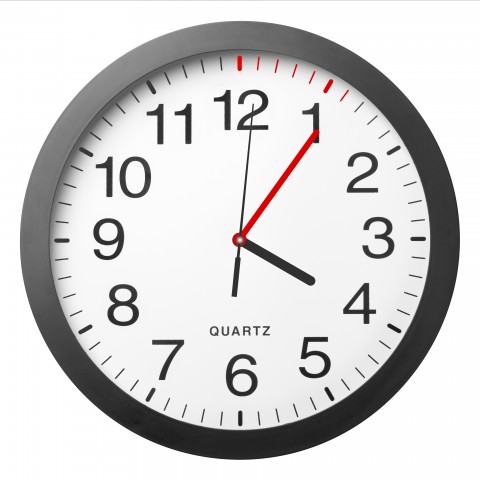
An hour is made up of sixty “minutes,” and in the U.S., we give the exact time by saying the hour and then the minutes. Minutes, here, refer to how many minutes after the hour it is. In writing, this is written with the number of the hour followed by a colon, and then the number of minutes after the colon: [Hour]: [Minutes After].
For example, this may look like:
- 1:34 (thirty-four minutes after one o’clock)
- It’s 1:34 a.m., what are you doing up?
- 3:16 (sixteen minutes after three o’clock)
- At 3:16 p.m., she finally left the hospital.
- 8:59 (fifty-nine minutes after eight o’clock, or one minute before 9 o’clock)
- It was 8:59 a.m. when she looked at the clock.
4. Hours Divided into Minutes

There are three common terms that we use to divide the hours into minutes in a simpler fashion: “quarter,” “third,” and “half.” This makes it much easier to quickly give someone the approximate time.
1- Quarter
In regards to time, people use the word “quarter” to represent 15 minutes (which is 1/4 of an hour, just as a quarter in U.S. money is 1/4 of a dollar). We use the phrase “quarter past” to say “fifteen minutes after” and “quarter to” to say “fifteen minutes until [or before].”
Here are some examples of this, with the time each one represents in parentheses:
- Quarter past 5 (5:15)
- Be ready for dinner at a quarter past 5.
- Quarter past 9 (9:15)
- The bus arrived at a quarter past 9.
- Quarter to 4 (3:45)
- She left work at a quarter to 4.
- Quarter to 7 (6:45)
- It was a quarter to 7, and Steve still hadn’t shown up.
2- Third
“Third” is not a common term used for time in the United States, but in case you do hear it used, it refers to 20 minutes (because 20 is 1/3 of 60). So “a third past” refers to twenty minutes after the hour, and “a third to” refers to twenty minutes before the hour.
- A third past 1 (1:20)
- Be there a third past 1.
- A third past 5 (5:20)
- They finished dinner at a third past 5.
- A third to 9 (8:40)
- She left the house at a third to 9.
- A third to 12 (11:40)
- At a third to 12, she stopped for lunch.
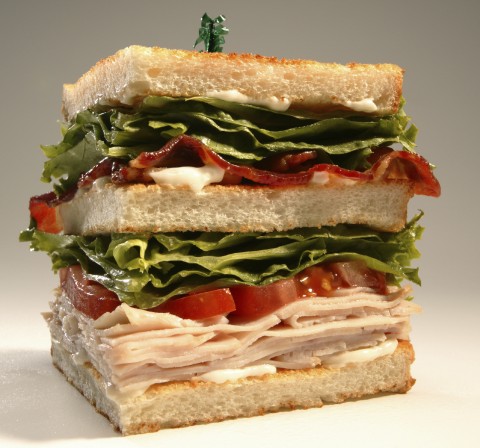
Honestly, you don’t need to worry too much about this one, as it’s rarely used and doesn’t sound as natural as “quarter” and “half” in conversation.
3- Half
“Half” is a very common phrase you’ll hear when people talk about time in English. “Half” refers to 30 minutes, as that’s half an hour (“half an hour” or “half-hour” are phrases you’ll also hear often, simply meaning 30 minutes). As with the word “quarter,” people use the phrases “half past” and “half an hour to” to describe 30 minutes after or until an hour, respectively.
- Half past 3 (3:30)
- Meet me at half past 3.
- Half past 7 (7:30)
- Bill woke up at half past 7.
- Half an hour to 6 (5:30)
- Quinton showed up half an hour to 6.
- Half an hour to 10 (9:30)
- Sue took her shower at half an hour to 10.
This is probably the easiest term to remember, as the time will always have a “thirty” in it. But be careful to always pay attention to the words “past” or “to.” Mixing these up can result in disaster!
5. How to Describe Time in English with General Time References
Knowing exact numeric times is important, but it’ll only get you so far. People in the United States often tell the time using general references, seeing as this is much faster and simpler when an exact time isn’t needed. Here’s a quick chart of the most commonly used references with their meanings and example sentences.

| Meaning | Usage in a Sentence | |
|---|---|---|
| Early Morning | “Early morning” refers to the very first hours of the day, and there is no specific time frame that this represents. However, “early morning” typically refers to anywhere from 3am to 9am, depending on who you ask. | Susan eats breakfast in the early morning after she wakes up. |
| Sunrise / Dawn | “Sunrise” and “Dawn” refer to the same time of day, which is whenever the sun happens to begin rising above the horizon. When “sunrise / dawn” occurs varies over the course of a year, occurring earlier in summer and later in winter. | The birds started singing at sunrise. Alex woke up right at dawn. |
| Noon / Midday | “Noon” and “Midday” refer to the same time of day, which is 12:00pm, or the very middle of a twenty-four-hour day. This is often around the time people have their lunch. | “Can we talk again at noon?” Tom asked her. Lillian always ate lunch around midday. |
| Early Afternoon | “Early afternoon” refers to approximately two to four hours after noon (from noon to about 2pm or as late as 4pm). | Vance enjoys walking in the early afternoon. |
| Late Afternoon | “Late afternoon” refers to approximately four to seven hours after noon (from about 4pm to 7pm). | They enjoyed a nice barbeque meal in the late afternoon. |
| Evening | “Evening” is just before sunset or nightfall. This usually refers to the time period from 7pm to 8pm, though this can vary over the course of a year, with evening being earlier in winter months and later in summer months. | She stayed out late that evening with her friends. |
| Sunset / Dusk | “Sunset” and “Dusk” refer to the same time of day, which is when the sun begins to set below the horizon. This is before nightfall, but no longer considered daytime. | Wendy and Rick watched the beautiful sunset together. At dusk the sky sometimes turns purple. |
| Night | “Night” refers to after the sun has set, and it’s dark outside. Depending on who you ask, it usually refers to any time after 8pm until sunrise the next day. | Kyle didn’t get any sleep yesterday night. |
| Midnight | “Midnight” refers to 12:00am, or the very middle of the night. | Ira woke up at midnight feeling very hungry. |

6. Time Adverbs
Adverbs are not the most fun thing to study, but in telling time, they are essential. With the adverbs I cover in this section, you can learn to tell time in a more general, easy-going way, and in a way that everyone will understand. But instead of telling the time, these adverbs describe the time.
1- Adverbs that Talk About the Present
These time adverbs all talk about something that is happening in the present time.
| Usage in a Sentence | Additional Information | |
|---|---|---|
| Right now | “Come over here, right now!” his mother said. | |
| Currently | I’m currently drinking a cup of coffee. | |
| At the moment | At the moment, Olive doesn’t know what to do. | |
| Meanwhile | Meanwhile, the tow truck took Al’s car away. | Note that “meanwhile” is different from the other words. Instead of simply talking about the present, it describes when something happens in the present, in relation to another action. For example, suppose Al went to a restaurant to eat but parked somewhere he shouldn’t have. The sentence would read: “Al enjoyed a burger at the restaurant. Meanwhile, the tow truck took Al’s car away.” |
| At the same time | They both started laughing at the same time. | “At the same time” means roughly the same thing as “meanwhile,” but it’s used a little bit differently. It normally refers to two actions or events that occur simultaneously. |
2- Adverbs that Place the Time
These time adverbs work to answer the questions: “When?” or “How long?” in terms of the current time.

| Meaning | Usage in a Sentence | Additional Notes | |
|---|---|---|---|
| Before | “Before” means previous to or prior to. | “Before I get started, I have a question,” the motivational speaker said. | This sentence indicates that the speaker will get started, but not until he’s asked a question. |
| After | “After” means later or at the end of something else. It’s the opposite of “before.” | After a long day, Sara spent the evening watching TV. | This sentence suggests that a long day has passed, and once it was over, Sara watched TV. |
| Soon | “Soon” means in the near future. | Henry was leaving for college soon. | This sentence suggests that Henry will leave for college not long from now. This could be hours or even a couple of months, as “soon” is a very vague and subjective term, and often depends on context. |
| Almost | “Almost” is similar to “soon,” and means nearly. | “It’s almost time!” he said excitedly. | The man in this sentence is excited because something he is looking forward to is happening soon. |
| In a little while | “In a little while” means that something will happen after a certain period of time, but it won’t be long. | I’ll be going to the store in a little while. | This is another vague term. In this sentence, the speaker is going to the store after an unspecified period of time has passed. In the case of something like going to the store, it probably refers to minutes or hours. |
| Not long after | “Not long after” is similar to “in a little while,” but gives a more specific idea of what will happen (or has happened) at the time being talked about. | Not long after watching a horror movie, Val thought she heard noises. | In this sentence, the thing that happened is Val watching a horror movie. Soon after, she thought she heard noises. |
| Later | “Later” is similar to “after,” but is a more general reference to a future time. | “Do you want to go out for dinner later?” Joe asked. | In this sentence, Joe hasn’t specified what time he wants to have dinner. But based on the context, it probably means a few hours from the current time, and a more specific time will be set up if the answer is yes. |
| For a long time | “For a long time” can essentially mean different things, but refers to much time passing or having passed. | “I haven’t been this depressed for a long time,” said Jane. OR “You were at the store for a long time,” said Uriel. | The first sentence suggests that Jane used to be that depressed but much time has passed since then. In the second sentence, Uriel is telling someone that they took a long time at the store. |
| Anytime | “Anytime” is a word that’s used when one isn’t picky or specific about a time. It means that any time is okay, or that something can happen at any time. | “You can stop by anytime,” said Liz. | In this sentence, Liz is okay with the person she’s talking to visiting her at any time. |
| As soon as possible | “As soon as possible” (often abbreviated to “ASAP”) means that something should happen at the earliest possible convenience. | “Come to the front office as soon as possible,” the announcement said. | In this sentence, the announcement wants someone to come to the office quickly, whenever they’re first able to. |
| In the near future | “In the near future” is a more formal, long-winded way of saying “soon.” It’s often used when talking about larger projects or events. | The sign read: “We hope to have this park reopened in the near future.” | In this sentence, the sign indicates the park will hopefully be open again soon. |
7. Proverbs About Time in English
In the United States, there are several proverbs and sayings related to time. In this section, I’ll only go over the most common idioms related to time in English, but these should give you a pretty good foundation.
- Time is money.
- When someone says “time is money,” they’re referring to the fact that the more time you work, the more money you’ll make. Working hard means more money.
- Time flies.
- When someone says “time flies,” they mean that time tends to go by quickly. A variation of this phrase is “time flies when you’re having fun,” which means that time goes faster when you’re enjoying how you spend it.
- Time is of the essence.
- This phrase means that time is the most important thing in a situation. People often say this when they need something done quickly.
- An inch of gold will not buy an inch of time.
- This phrase means that time is of greater value than gold or money. No matter how much money you have, you can never get back your time, so it’s important to use your time wisely and not be too focused on using it for work. A variation of this phrase is “time is more precious than gold.”
- Time heals all wounds.
- This phrase means that when someone’s been hurt (either physically or emotionally), it will get better with time. A variation of this phrase is “time heals most wounds,” which suggests that some wounds never heal at all, or require more than time to heal.

- You can’t stop time.
- When someone says that you can’t stop time, it means that time always continues and there’s no way of getting around it.
- Ahead of one’s time.
- If someone is “ahead of their time,” it means that they’re a forward-thinking individual, and wise.
- Behind the times.
- On the other hand, if someone is “behind the times,” it means that they’re still living in the past, or not adapted to life’s changes as time goes on. This is often used in a negative sense.
- Time of your life.
- If someone has the “time of their life,” it means they’re having a lot of fun or that a lot of good things are happening to them. This phrase suggests that it’s the best time of their life.
- Live on borrowed time.
- The phrase “live on borrowed time” means that everyone “lives on borrowed time,” in that we should consider our time precious because it doesn’t really belong to us, but was rather given to us. (You wouldn’t spend borrowed money on silly things, or be reckless with a borrowed object, would you?)
- At the eleventh hour.
- “At the eleventh hour,” refers to the latest time at which something can or will happen. A similar phrase is “at the last minute.”
- Beat the clock.
- When someone “beats the clock” it means that they’ve done something just in time, before it was too late.
- Around the clock.
- If someone does something “around the clock” it means that they never stop, and are always doing it.
- 24/7.
- “24/7” means about the same thing as “around the clock.” If someone does something 24/7, they’re always doing it. “24/7” is short for “twenty-four hours a day, seven days a week.”
- It’s about time.
- Someone usually says “it’s about time” when they’ve been waiting for something to happen and it finally does. It’s usually said in a joking or impatient manner.
8. Conclusion: How EnglishClass101 Can Help You Master English

So, reader, do you understand how to tell time in English better now? Is there anything about telling time you’re still struggling with or don’t understand? Let us know in the comments, and we’ll be glad to help!
This article covered a lot of information about telling time in U.S. English, and it’s expected that you’ll need to go over some of this information again to fully process it. You’re a trooper for making it this far, and I hope you feel a little more comfortable telling the time now!
Keep in mind that when learning about telling time in English, practice is key. Practice as much as you can, and you won’t regret it.
As you continue to learn to tell time, you may also find it handy to check out my article on dates in U.S. English—you’ll be using time and dates together quite often, after all!
EnglishClass101.com has many more learning tools for you, including insightful blog posts on an array of topics and free English vocabulary lists for you to study. For a more personalized, one-on-one approach to learning English, you can also upgrade to Premium Plus to take advantage of our MyTeacher program!
English is one of the most difficult languages to learn, so the fact that you’ve come this far shows your determination and ability. Know that you can master English, and EnglishClass101 will be with you at each step of your journey!

Learn Directions in English: North, South, East, West & More

Knowing how to get from point A to B, especially in a new environment, is paramount. Having things to do and places to go in a new location is meaningless if you have no idea how to get there. Asking for directions (and giving them) in their own language is one of the most important skills a person can have—making it even more vital when visiting a country that speaks a different language.
Learn how to ask and give directions in English with EnglishClass101’s complete guide to directions in English!

Table of Contents
- Cardinal Directions in English: Using North, South, East & West
- Giving Road Directions in English
- Describing Directions in English with Landmarks
- Must-know Phrases for Asking Directions
- Must-know Phrases for Giving Directions
- Putting it All Together!
- Conclusion
1. Cardinal Directions in English: Using North, South, East & West

1- Basic Directions
As you may know, there are four basic directions on a compass or map:- North: On a traditional map orientation, North is up.
- South: On a traditional map orientation, South is down.
- East: On a traditional map orientation, East is to the right.
- West: On a traditional map orientation, West is to the left.
2- Combinations
There are also terms for the directions between the four compass directions in English that you should be aware of:- Northwest: This refers to the direction between North and West.
- Northeast: This refers to the direction between North and East.
- Southwest: This refers to the direction between South and West.
- Southeast: This refers to the direction between South and East.
3- Talking About Directions on a Map

There are a few basic sentence patterns you should know when learning about English directions:
- ___ [place] is ___ [direction word] of ___ [another place].
- [Oregon] is [south] of [Washington].
- ___ [town/city] is in the ___ [direction word] part of ___ [country].
- [San Diego] is in the [western] part of [the United States].
- ___ [country] is to the ___ [direction word] of ___ [another country].
- [The United States] is to the [south] of [Canada].
- ___ [specific place] is to the ___ [direction word] of ___ [another place].
- The [San Diego Zoo] is to the [north] of [San Diego].
- Note here that you can also say: “The [San Diego Zoo] is in [northern] [San Diego].”
You may have noticed in a couple of examples that the direction word ended with “-ern.” This suffix is added to a direction word when it’s used as an adjective to describe a nonspecific area. For instance, in the second example, “western” is used to describe San Diego’s general direction within the U.S, not a specific area or direction.
Other examples include:
- Northern hemisphere
- Eastern heritage
- Southwestern food
2. Giving Road Directions in English

Now that you understand the basic map directions, it’s time to learn how to ask and give directions in English. More specifically, how to do so on the road.
It’s unlikely that you’ll use north, south, east, and west when trying to find a specific place. For example, when you’re roaming the streets of Seattle, Washington looking for the Fremont Troll, these basic directions just won’t cut it.
1- Basic Opposites
When learning about directions in the English language, there are some common words you’ll often hear and use when looking around for different places. Here, I’ve paired opposites and their definitions so you can grasp the meaning of each. These are useful for giving street directions in English, in particular.
1. Front & Back
“Front” refers to being towards the face of something; “back” is the opposite, or being towards the opposite side of that thing. Here are some basic examples of how you may hear these words used in directions:
- The bookstore is to the front of the park.
- The police station is to the back of the park.
2. Left & Right

“Left” refers to the left-hand side, while “right” refers to the right-hand side.
- You’ll find the hotel on the left.
- Turn right at the stop sign.
3. Far & Close
“Far” means that something is a long distance away from where you are now. “Close” means that something is nearby.
- The Metropolitan Museum of Art is pretty far from here.
- But Mount Rainier is close.
4. In front of & Behind
If something is “in front of” something, it means that it’s to its face. If something is “behind” something, it’s to its back.
- The library is in front of the grocery store.
- The grocery store is behind the library.
5. Up & Down
“Up” can either refer to the direction of the sky, or to an increase in elevation. “Down” can either refer to the direction of the ground, or to a decrease in elevation.
- I like looking up at the sky. [Direction of the sky]
- Take the elevator up to the third floor. [Increase in elevation]
- Don’t look down! [Direction of the ground]
- The ball slid down the ramp. [Decrease in elevation]
6. Over & Under
“Over” refers to crossing on top of something, and “under” refers to crossing beneath something.
- Cross over the John F. Kennedy Memorial Bridge.
- Pass under the bridge and then turn left.
7. Across from & Next to
If something is “across from” something, it means that it’s directly facing it from a distance (usually with something in-between them, like a road or a lake). If something is “next to” something, it’s beside it.
- Barbara’s house is across from Sara’s.
- Jill sat next to Bill in class.
2- With References
Here are some common phrase patterns you’ll hear when being given directions. Many of these phrases contain words from the list above. If you want even more examples, you can check out our relevant vocabulary list.
1. Next to ___
If something is “next to” something else, it’s adjacent to it (directly beside it).
- The hair salon is next to the game shop.
- You’ll find the museum next to the park.
2. ___ away from
This phrase refers to something’s distance from another position, either in terms of measurable distance or time.
- The Grand Canyon is about one-hundred and thirty-five miles away from the Horseshoe Bend.
- The pizzeria is about five minutes away from the apartment.

3. Across the street from ____
When someone uses this phrase, it means that the location you’re looking for is separated by a street from something else.
- Across the street from the apartments, you’ll find the ice cream shop.
- The ranch is across the street from the high school.
4. By the intersection
An “intersection” is a place where the roads join, usually from four different directions, and traffic from each road must wait to make a turn or continue forward. This phrase indicates that the location you’re looking for is near an intersection.
- The church is by the intersection.
- The farmer’s market is located by the intersection.
5. Around the corner
“Around the corner” refers to turning left or right around the corner.
- Drive around the corner, and you’ll find the music shop.
- The Gettysburg National Military Park is just around the corner.
6. Up/down the road
Oftentimes, people will tell you to go up or down the road. Going “up” the road usually means going in the direction that it’s most elevated (e.g, slightly uphill), and going “down” the road usually means going in the opposite direction.
People often use hand gestures to show you which way you should go, especially when you’re not sure.
- The next gas station is just up the road.
- Go back down the road a few miles to find the rest stop.
7. Near the ___
This phrase means that the place you’re looking for isn’t far from the place mentioned.
- The Bronx Museum of the Arts is near the Yankee Stadium.
- St. Patrick’s Cathedral is near the Rockefeller Center in New York.
8. To the right/left of ___
This is a common phrase to use with landmarks (which I’ll discuss more below). It means that you should turn right or left at a specific place or within proximity of a certain object. It can also be used to show you where to look, as in the examples below.
- There’s a sign to the right of the road.
- If you look to the left of the mountain, you can see an airplane.
9. Close to the ___
This phrase is practically the same in meaning as “near the ___” and is used exactly the same way.
- The fire station is close to the main road.
- Stay close to the freeway exits.
10. In front of/Behind the ___
To be “in front of” something means to be at its face. To be “behind” something is to be at its back. This phrase is often used to let you know where something is in relation to something else.
- You pay for your tickets in front of the arena.
- The supermarket is behind the cafe.
3. Describing Directions in English with Landmarks
Landmarks are special objects or other defining factors that make an area distinct from others. Landmarks can be manmade and intentional, or they can be everyday objects like trees, rocks, and even graffiti.
People frequently use landmarks when giving directions to someone, as it makes the directions less daunting and more specific. I know I feel more comfortable following directions when I hear words like “big tree,” “farm,” or “hotel,” instead of “Go due northeast fifty-two miles blah blah blah.”
Here are some common landmarks and phrases you may hear when someone gives you directions during your travels.
1- In the City
- Airport
- Turn left at the airport.
- Subway station
- When you see the subway station, make a right turn.
-
- City center/downtown
- Once you reach the city center, keep going straight through.
- Park
- You need to turn right at the park.

- Hotel
- The first thing you’ll see after you turn is a big hotel.
- Hospital
- You can find the diner near the hospital.
- Bank
- From the bank, make a left.
- [Restaurant name]
- When you see the McDonald’s, pull in and turn around.
- [Famous landmark]
- At the end of the Golden Gate Bridge, keep going straight.
- Railroad tracks
- Cross the railroad tracks, and go down the road a few miles.
- Mall
- After you pass the mall, make a left onto the next street.
2- On a Road
- Intersection
- Make a right at the second intersection.
- Traffic light
- At the traffic light, make a left.
- Crosswalk
- After you’ve made it over the crosswalk, make a right turn.
- Newspaper stand
- Go around the corner where that newspaper stand is.
- Gas station
- The hotel is just a few miles up the road from the gas station.
- Rest stop
- From the rest stop, go back a few miles.
- Stop sign
- Keep going straight at the stop sign.
- Farm
- Make a right on the road just after the farm.
- [Road name]
- Make a left on Rose Petal Lane.
3- In a Structure or Building

- Restroom
- Turn the corner where the restroom is.
- Elevator
- At the elevator, turn right.
- Gate
- Wendy’s is just across from Gate 3.
- Parking lot
- You’ll find the front office just across this parking lot.
- Meeting room
- After you pass the meeting room, turn left.
- Terminal
- Go straight through Terminal 1.
- Parking garage
- It’s on the third floor of the parking garage.
- Gym
- Just before the gym, make a right.
- Drinking fountain
- Make a left at that drinking fountain.
- Breakfast room
- Past the breakfast room, you’ll find an elevator.
4. Must-know Phrases for Asking Directions

When asking about directions in English, it’s always a good idea to include a polite beginning phrase, your question or need, and a courtesy or thank you phrase.
1- Polite Beginning Phrases
People tend to be more receptive and helpful when you begin with a polite phrase. These are some common ones:
- Excuse me…
- Pardon me…
- Sorry to bother you…
- May I ask…
- Do you happen to know…
You can also combine some of these phrases to create a better-sounding sentence. Most of the time, you’ll want to start your polite phrase with one of the first three phrases, followed by one of the latter two phrases.
- Excuse me, may I ask…
- Pardon me, do you happen to know…
- Sorry to bother you, may I ask…
2- Questions
After your polite phrase, you can ask your question. There are a few different question formats you can use:
- …where ___ is?
- May I ask where Main Street is?
- …where I can find ___?
- Do you happen to know where I can find the Six Flags amusement park?
- …how to get to ___?
- Do you happen to know how to get to the subway station from here?
- …how far ___ is?
- May I ask how far Universal Studios is?
- …if ___ is far from here?
- Sorry to bother you… May I ask if the Hollywood Walk of Fame is far from here?
3- Courtesy Phrases / Thanks
After the person you’re talking to has given you directions (or guided you to someone who can help), it’s always good to thank them. Here are the most common ways to do so:
- Thank you.
- I see, thank you.
- I appreciate your help.
4- Examples
Here are some examples of how to ask for directions, using the above phrase formats.

- Excuse me, where is the restroom? … Thank you!
- Sorry to bother you, how do I get to the Prescott Valley Event Center? … I see, thank you.
- Pardon me, may I ask how far Disneyland is from here? … I appreciate your help.
5. Must-know Phrases for Giving Directions
Let’s say that someone asks you for directions. How do you tell them which way to go, or what steps to take to reach their destination? In this section, I’ll go over a few of the most basic and practical phrases you can use and their definitions.
1- Street Phrases
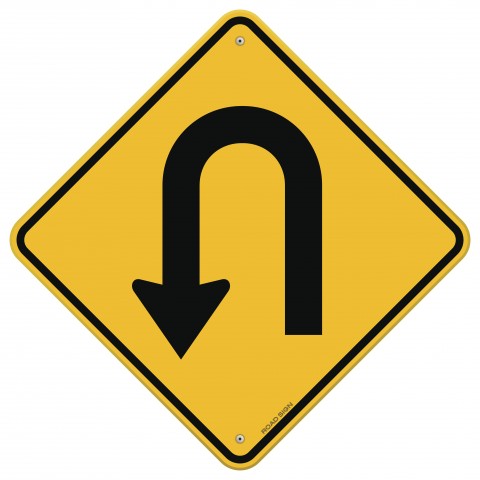
- Go straight
- This means to continue going in the direction you’re facing.
- “At the library, go straight.”
- Go straight until ___
- This means the same thing as above, but also includes information on when to stop.
- “Go straight until you reach the traffic light.”
- Go back
- This means to go in the opposite direction.
- “When you reach the bookstore, go back.”
- Go back until you reach ___
- This means the same thing as above, but also includes information on when to stop going back.
- “Go back until you reach the Pahranagat National Wildlife Refuge.”
- Make a U-turn
- A “U-turn” (sometimes called a “U-ey”) is when you change direction by turning in the shape of a “U.” Always watch out for signs that prohibit this, though.
- “Make a U-turn before you reach the next rest stop.”
- Turn left/right
- This means that you make a left or right turn.
- “Then turn left/right.”
- Turn left/right at ___
- This means the same thing as above, but includes information on where exactly to make the turn.
- “Turn left/right at the stop sign.”
- Stay on ___ [road/street] until ___
- This one’s a little more complex, and means to stay on the same road until a certain point is reached.
- “Stay on Pheasant Drive until you reach Cherokee.”
2- For Buildings
- On the ___ floor
- Use this phrase to specify what floor of a building something is on.
- “You can find Mr. Reynolds on the third floor.”
- Go upstairs/downstairs
- Use this phrase to tell someone to change floors either up or down via the stairs.
- “Go upstairs to reach him.”
- Take the elevator
- Use this phrase to tell someone to change floors either up or down via the elevator.
- “Take the elevator down to the basement.”
- The room to the left/right OR The room straight ahead
- Use this phrase when indicating a specific room.
- “The bathroom is the room to the right.”
- “You can find a vending machine in the room straight ahead.”

- Just around the corner
- Use this phrase to let someone know that all they have to do is turn the corner to find what they’re looking for.
- “There’s a drinking fountain just around the corner.”
- You’ll see a ___ [marker of some sort]; ___ [direction] here.
- This one is more complex. Use it to indicate a landmark or specific object, and tell the person what to do once they reach it.
- “You’ll see a ficus plant; turn left here.”
3- Driving Directions in English
- Keep going
- Use this phrase to tell the person driving to continue going in the same direction.
- “Keep going until you reach the intersection.”
- Stop
- Use this phrase to tell the person driving to stop the car.
- “Stop at the nearest gas station.”
- Hurry up / Go faster
- Use this phrase to tell the person driving to speed up the car and drive faster.
- “When we reach the freeway, hurry up a little / go faster.”
- Slow down
- Use this phase to tell the person driving to drive slower.
- “Slow down once we reach town.”
- Turn right/left at ___
- Use this phrase to tell the person driving to make a turn at a specific point (e.g. a stop sign or traffic light).
- “Turn right/left at the church.”
- Turn right/left in about ___ [estimate of distance]
- Use this phrase to tell the person driving to make a turn after they’ve driven a certain distance.
- “Turn right/left in about five miles.”
- At the ___ turn right/left
- This phrase is similar to the two previous phrases. Use this phrase to indicate where the person driving should turn.
- “At the gate, turn right/left.”
4- Reassurances

Reassurances can make all the difference when giving someone directions, especially if that person is frantic to find the place or is running late. Here are a few phrases you can use to ensure that the other person remembers and understands your directions, which will make both of you feel better.
- You won’t miss it.
- You can use this phrase to let the person know that what they’re looking for (whether their destination or a landmark) is easy to find, and that they’ll know when they reach it.
- You’ll know you’re there when ___.
- This is similar to the above phrase, but offers information on what to expect or look for at a certain point.
- Did you get that?
- Asking the other person if they “got” your directions (meaning to remember and understand the directions) gives them a chance to ask you to repeat the directions if needed.
Other ways to ensure that the person you’re giving directions to arrives safely at their destination include:
- Offering a description of the place
- Repeating the directions
- Asking them to repeat the directions back to you
5- What if You Don’t Know?
If you’re new to the area (or just bad with directions, like I am…), you probably don’t know how to help. In this case, just say so:
- I’m sorry, but I don’t know where that is.
- I’m sorry, I’m new here too.
- I’m not sure how to get there, sorry.
If you happen to be in a public area (such as a hotel lobby or restaurant), you can also suggest that they talk to someone more knowledgeable—like a receptionist or server.
6. Putting it All Together!

So, what do you do with all of these words and phrases? What do they look like in an everyday conversation about directions? In this section, I’ll provide an example conversation about directions in English using more complex directions based on those I outlined in this complete guide to directions in English. This should give you a better idea of how to ask and give directions in English.
—
You’re visiting the state of California and want to hit most of the tourist attractions before you leave. Right now, you’re on your way to SeaWorld but have gotten lost along the way. You pull over into a gas station and go inside to ask the clerk for directions:
You: Excuse me, how do I get to SeaWorld from here?
Clerk: It’s just south of here. Keep going down the road, then around the corner. From there, keep going straight until you see Montgomery-Gibbs Executive Airport, and then make a left on Kumeyaay Highway. Follow the road until you reach SeaWorld. Trust me, you won’t miss it.
You: Thank you, I appreciate your help.
Clerk: No problem. Did you get all that?
You: [Repeats directions.]
Clerk: Good. Have fun.
7. Conclusion
I hope you learned something new about giving and asking for directions in English, and that you feel more comfortable doing so. Understanding directions in English will take time and practice, but we know you can do it. Is there anything you’re still unclear about? Let us know in the comments!
To continue learning about the English language, explore EnglishClass101.com and start using our range of fun and practical learning tools. You can read more insightful blog posts like this one, study free English vocabulary lists, and chat with fellow English learners on our community forums. For a more personalized and guided learning experience, you can also upgrade to Premium Plus and take advantage of our MyTeacher program!
English is not an easy language to learn, but your determination and hard work will pay off, and you’ll have our constant support along the way. You’ll be able to speak, read, and write in English like a native before you know it! 🙂

Learn Nouns in English: 100+ Must-know English Nouns!

Nouns refer to objects or concepts—usually a person, place, or thing. Virtually any conversation you’ll have in English will involve you or the other party talking about nouns:
- “The zoo was busy yesterday.”
- “Henry left the meeting early.”
- “This article is all about nouns.”
Thus, learning the most common nouns in English is necessary if you hope to hold a conversation for very long! In this article, I’ll go over the most vital 100 nouns in English you need to know. These are words you’ll hear or read often, and that you’ll find yourself needing to use on a regular basis.
But before I start the list of 100 nouns in English, it’s important that you know about the types of nouns in English and how to use them. Below you’ll find information to help you learn about English nouns.

Table of Contents
- Types of Nouns in English & How to Use Them
- 100+ Most Common Nouns in English
- Conclusion: Master Nouns in English & Much More with EnglishClass101!
1. Types of Nouns in English & How to Use Them

1- Types of Nouns in English Grammar
There are three main types of nouns in English, in terms of class: Common vs. Proper, Concrete vs. Abstract, and Countable vs. Uncountable.After these classifiers, there are also Collective, Mass, and Partitive nouns.
1. Common and Proper Nouns
A common noun is a noun that refers to a person, place, or thing, without using a proper name. It’s simply whatever the thing is called, in a general sense.A proper noun, on the other hand, is the name of a specific entity, such as a nation, building, or person. In English, all proper nouns are capitalized; words like “Monday” should never be written as “monday”. Proper nouns are also individual examples of common nouns, but not all instances of common nouns have associated proper nouns. For example, a horse (common noun) may be named “Mr. Ed” (proper noun), but not all horses have names. Below are some examples of this:
| Common Nouns | Proper Nouns |
| Cat | Fluffy |
| Building | Empire State Building |
| Man | Mr. Jerry |
| Park | Hanging Rock State Park |
| Language | English |
2. Concrete and Abstract Nouns
Concrete nouns are nouns that are tangible; you can see them, smell them, hear them, taste them, and physically touch or feel them.English abstract nouns are nouns that you can’t experience using your five senses, but are still real.
Below are some examples.
| Concrete Nouns | Abstract Nouns |
| Bacon (You can eat and taste bacon.) | Idea (Ideas are real, but aren’t tangible.) |
| River (You can see, hear, and feel a river.) | Loyalty (Loyalty is a real concept, but isn’t tangible.) |
| Candle (You can see, touch, and smell a candle.) | Intelligence (Intelligence is real, but not tangible.) |
| Pillow (You can see and touch a pillow.) | Hope (Hope is real, but can’t be felt with the five senses.) |

3. Countable and Uncountable Nouns
Countable nouns are nouns that you can count using a definite number.Uncountable nouns are those that can’t be counted using a definite number.
Below are some examples.
| Countable Nouns | Uncountable Nouns |
| Book | Wisdom |
| Elephant | Joy |
| Rock | Nostalgia |
| Eraser | Paperwork |

Note that you can use countable nouns in both singular and plural forms. For example, you can say “a book” or “three books,” and be grammatically correct.
However, uncountable nouns can only be used in singular form, typically without an article; it would sound funny to say “a nostalgia” or “six nostalgias.” Rather, you would say something along the lines of “Finding my Tamagotchi gave me nostalgia.”
4. Collective, Mass & Partitive Nouns
This is where things can get extra tricky with nouns in English grammar, so don’t worry if you need to go over this section a few times!Collective nouns refers to a collection of several things, usually people or animals. It is a single word that encompasses many of the same things.
Mass nouns refer to a noun that can’t be “counted,” but is still measurable.
Partitive nouns refers to a part of something, usually part of a mass noun. Use of this noun usually involves the following sentence structure: ___ [partitive noun] of ___ [mass noun].
For your convenience, here are some lists for each type of noun, with example sentences so you can see how these nouns are used in English grammar.
| Collective | Mass | Partitive |
| Crowd “He pushed through the crowd.” | Flour “Bert had to pick up more flour at the store.” | Slice “He ate another slice of pizza.” |
| Pack “A wolf pack trekked through the snow.” | Dust “The DVD collection began gathering dust.” | Cut “Morty wanted the best cut of meat.” |
| Herd “He corralled the herd.” | Pepper “The sandwich needed more pepper.” | Piece “She ate the last piece of cake.” |
| Flock “The birds flew together in a flock.” | Juice “She poured some juice for her daughter.” | Spoonful “A spoonful of honey is very sweet.” |
2- How to Form Plural Nouns

So, how do you take a singular noun and make it plural?
It depends on the word, though you almost always add an “-s” to the end. There are instances, however, where you add “-es” or “-ies.”
Here are some examples of these rules, but keep in mind that there are exceptions to these rules more often than not.
1. Add -s
The majority of nouns in English simply require you to add an “-s” in order to make them plural. In particular, nouns that end with -th, -ph, -o, -f, -fe, and -on, almost always become plural by adding an “-s,” though this pluralization isn’t limited only to these endings.Here are some examples:
- Cat > Cats
- Eye > Eyes
- Mountain > Mountains
- Risk > Risks
2. Add -es
There are some nouns which require you to add an “-es” in order to make them plural.Oftentimes, these are nouns that end in a double “s,” as we don’t put three s’s consecutively in English.
There are other instances where “-es” is used, such as when a noun ends in -sh, -ch, -s, -x, or -z. Further, there are instances where nouns ending in “-o” require -es instead of -s (though the rules for this are flimsy).
Also, “-es” is required for nouns that end in “-is.”
Here are some examples of each rule above:
- Dress > Dresses
- Glass > Glasses
- Eyelash > Eyelashes
- Tomato > Tomatoes
- Basis > Bases
3. Add -ies
The rule for “-ies” is simple. For any singular noun that ends in the letter “y,” remove the “y” and replace it with “-ies.”- Library > Libraries
- Party > Parties
- Country > Countries
- Bunny > Bunnies
The only exception to this rule is when the “-y” is preceded by a vowel, in which case only an “-s” is needed (e.g. way > ways).
4. Add -i
Nouns that end in “-us” can be made plural by replacing the “-us” with “-i” (e.g. fungus > fungi).
There are also some words that are both singular and plural. Some examples include “deer,” “sheep,” “pants,” and “scissors.”
3- What’s the Difference Between an English Noun and Pronoun?
Differentiating between an English noun and pronoun can be difficult, especially for those new to the English language.Technically speaking, a pronoun is a type of noun. Pronouns are nouns that are used for the sole purpose of identifying a person, animal, or thing (rather than simply naming it). Common pronouns include “he,” “she,” and “it”; these indicate who or what is being referred to, without using a proper noun (such as a name).
Distinguishing between an English noun and pronoun is something that you’ll become better at with lots of practice and experience!
2. 100+ Most Common Nouns in English

Now that you have a better idea about how nouns are used, you should find this nouns list a lot more useful. Let’s go over the 100+ most common nouns in English!
1- Appliances
We live in a world filled with appliances designed to make our lives easier. Knowing the names of common appliances in English will be essential when you visit, or relocate to, an English-speaking country. Here’s an overview of the most common and practical appliances in English.| Word | Meaning | Usage in Sentence | Additional Notes |
| TV | “TV” is short for “television,” which is found in nearly every American household. These words can be used interchangeably. | The TV broke, so Sasha couldn’t watch the season finale of her favorite show. | |
| Fridge | An appliance used to keep food cold and fresh, usually vegetables, meats, and other foods/beverages that are best kept cold. | Alaina put the soda can in the fridge so it would be cold when she drank it later. | “Fridge” and “freezer” are often used together in sentences, due to their similar uses. |
| Freezer | An appliance used to keep food frozen. This is often done to ensure that the food remains edible for long periods of time. | Mark took the leftover chili out of the freezer to thaw for dinner that night. | Oftentimes, people have an appliance that serves as both a fridge and a freezer. |
| Air Conditioner | An appliance used to keep a home (or room) comfortably cool, especially during the warmer months. Also called an “AC.” | Sweating, Henry got up to turn on the air conditioner. | |
| Heater | An appliance used to keep a home (or room) warm, especially during the cooler months. | Jenny turned up the heater as she watched the snow fall outside. | |
| Fan | An appliance that keeps a home cool by keeping the air circulated; however, this doesn’t keep a home at a certain temperature, like air conditioners do. | Gretta stood in front of the fan to cool down after her run. | |
| Washer | An appliance used to wash clothing. | Sue put the dirty clothes in the washer this morning. | |
| Dryer | An appliance used to dry clothing after it’s been washed. | Later, her husband put them in the dryer. | “Washer” and “dryer” is another pair of words that tends to be used together. |
| Microwave | A “microwave” (also called a “microwave oven”), is a kitchen appliance used to heat food as well as pop popcorn or melt butter. | Beatrice heated the leftover food in the microwave to have for lunch. | |
| Hairdryer | A “hairdryer” is a handheld appliance used to dry hair after bathing or otherwise getting one’s hair wet. | Mel just bought a new hairdryer. | |
| Dishwasher | A “dishwasher” is an appliance that’s used to clean dishes and silverware. | After dinner, she collected the dishes and put them in the dishwasher. | Not to be confused with just a “washer,” which washes clothes. |
| Coffee maker | A “coffee maker” is an appliance that makes coffee after water and coffee grounds have been put in. Coffee makers come in various forms, but they all do basically the same thing. | Al became grouchy after his coffee maker broke this morning. |
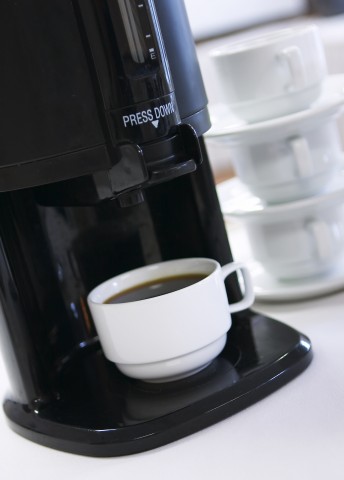
2- Technology
The world is continually evolving toward an internet- and technology-based existence. This makes it essential to know and understand the most basic technology nouns! Below is a list of the words you’ll most likely need to know, and will be using, while in an English-speaking country.| Word | Meaning | Usage in Sentence | Additional Notes |
| Computer | A “computer” is a device that people use for many purposes, namely to go on the internet or perform other digital tasks. | Alex needed a new computer for work. | |
| Keyboard | A “keyboard” is a device comprising of several letter, number, and action keys that people use for typing on a computer. | Ellen spilled coffee on her keyboard, so it stopped working. | |
| Mouse | A “mouse” is a device that people use to move the cursor on the screen of a computer or laptop. | Carlos’s hand hurt after using the mouse all day. | Mouse here is not to be confused with the animal mouse! |
| Laptop | A “laptop” is similar to a computer, though it tends to be smaller and is portable. Its name refers to the fact that a person can set it on their lap as they work on it. | Lucy was glad that she could bring her laptop on the plane. | |
| Tablet | A “tablet” is a device smaller than a laptop, and usually doesn’t fold like a laptop does when not in use. Tablets normally have good internet functionality and are often used for gaming or reading. | Pierre purchased the new book to read on his tablet. | |
| Cellphone | A “cellphone” is a device that’s relatively small (usually able to fit in someone’s pocket) and is used wirelessly to call or text message others as well as go online (if it’s a smartphone). | Ollie dropped his cellphone on the ground and the screen shattered. | |
| Headphones | “Headphones” are a device that one puts on their head (similar to ear muffs or a headband) to listen to music via another device (like a laptop). | Victor wanted to buy new headphones, but didn’t have enough money. | You may hear someone refer to “earphones” or “earbuds.” These are devices that are used for the same purpose, but are smaller and the part with the speaker is put inside the ear, not over it. |
| Charger | A “charger” is a device with a wire which is plugged into an outlet on one end, and a device on the other, to recharge the battery. | “Can I borrow your charger?” asked Kayla. | |
| Battery | A “battery” gives certain devices the energy they need to run and function. | The battery was running low, so Amber hurried to charge it. | “Charger” and “battery” are often used together in a sentence, as “chargers” are used to charge “batteries.” |
| Wi-Fi | “Wi-Fi” allows you to have internet access while away from home. | Molly was disappointed that the store didn’t have Wi-Fi. | |
| Internet | When you go online, you are using the “Internet.” | Riley and her boyfriend didn’t have internet the first week in their new apartment. | |
| Service | People often use the word “service” to mean either a service provider (usually for the internet), or the service itself. | “I can’t believe I don’t get service here!” said Ray at his grandparents’ house. | “Wi-Fi,” “internet,” and “service” are often used together, as they all relate to each other. |
| Website | A “website” is a specific place on the internet, defined by a web address. | Bob had always dreamed of running his own website. | |
| Picture | A “picture” is an image, and in this case refers to one you would find online. | Ken liked Elle’s picture on Facebook. | This can also be called a “photo” or a “pic.” |
| File | A digital “file” is similar to a real-life file. It’s a place on a computer or other device where you can store information or programs. | Ingrid saved the file before leaving work. | |
| Account | An “account” is something that allows a person to access something online or on a device. | She couldn’t believe her Twitter account was hacked. | “Account,” “Username,” “Password,” and “Login” are often used together, as they’re closely associated. For example, your login is composed of your username and password, which are used to access your account. |
| Username | A “username” refers to what a device or website will know you as, and is almost always required alongside a password for access to an account. | Manny wanted his username to be different than his real name. | |
| Password | A “password” is a word, phrase, or series of numbers+letters that only you (or a select group of people) know, and is used to gain access to an account or information. | Sandra forgot her password again. | |
| Login | A “login” usually refers to login information (usually a username + password). | Hans would never let anyone know his login information. |
3- Transportation
From the moment you begin your journey, transportation is one of the most urgent factors you’ll have to consider. Throughout the United States, you’ll find many different modes of travel and transportation; in the list below, you’ll find the most common nouns in English that have to do with transportation.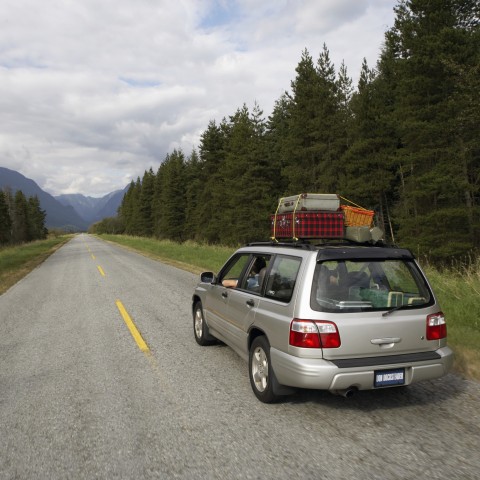
| Word | Meaning | Usage in Sentence | Additional Notes |
| Airplane | An “airplane” (sometimes just called a “plane”) is a means of transportation by air. | Omar was relieved when he found his airplane ticket. | |
| Airport | The “airport” is where planes land and take off from, and where people go to board a plane. | “What time should I pick you up at the airport?” asked Carmen. | |
| Train | A “train,” commonly referred to as a “locomotive,” is a fast mode of transportation by railway. | Wayne had always wanted to ride a train around the countryside. | |
| Train station | The “train station” is where trains go and leave from, and where people board the trains. | He couldn’t believe how crowded the train station was. | |
| Subway | A “subway” is an underground train system. | Mya almost missed the subway train. | |
| Bus | A “bus” is a common mode of public transportation; it’s a large, long vehicle that carries many people to various locations. | Aunna hated riding the bus to work. | |
| Bus stop | The “bus stop” is where buses go to and take off from, and where people board the bus. | There are few things more miserable than waiting at a bus stop in the cold. | |
| Taxi | A “taxi” is another form of public transportation, consisting of a normal-sized car and a driver, who will take you where you need to go. | Kim waited and waited, but couldn’t get a taxi to stop for her. | Taxis are a common mode of transportation in the United States, and you’ll find access to traditional taxi services as well as those by companies like Uber and Lyft. |
| Bike / Bicycle | A “bike” (or “bicycle”), is a means of transportation with two wheels that moves as you pedal. | To get more exercise, Gretchen started riding her bicycle everywhere. | |
| Traffic light | A “traffic light” (also called a “traffic signal”) is a device over busy intersections that indicate whether to stop your vehicle or continue going through, based on what color the light is. | Gordon enjoyed looking at the scenery while stopped at the traffic light. | |
| Intersection | An “intersection” is a place on a street where vehicles can be coming from multiple directions. | Risa felt nervous when approaching the intersection. | |
| Road | A “road” is a place where vehicles drive or people walk, and is relatively small and usually not busy. | Taylor thought it was peaceful walking down the dirt road in the evening. | |
| Street | A “street” is usually larger than a road, and busier. It’s usually meant only for vehicles/bikes. | Nikki looked both ways before crossing the street. | |
| Area | An “area” is a general space or place. | “I live in the area surrounding the library,” he told her. |
4- Restaurant
I don’t know about you, but eating out at restaurants is my favorite part of visiting new places. Food and dining atmospheres are both comforting and adventurous at the same time! To ensure that you have the best dining experience possible, be sure to study these relevant English nouns for beginners!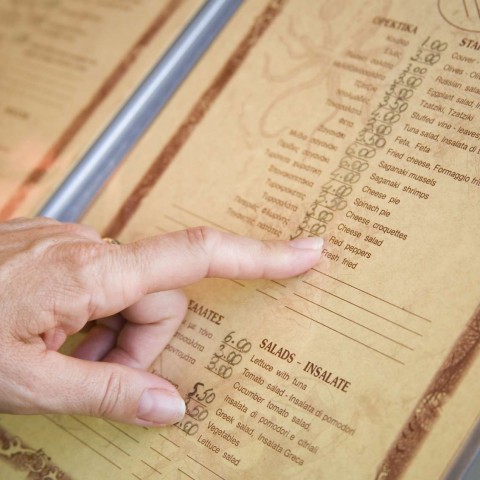
| Word | Meaning | Usage in Sentence | Additional Notes |
| Table | A “table” is an elevated platform that people sit around to eat. | “Which table should we sit at?” asked Barnie. | |
| Menu | A “menu” is a selection of what’s available to eat and drink at a restaurant, and how much it costs. | “Wow, there’s so much on the menu to choose from,” said Lisa. | Depending on the restaurant, the menu can be on a large board above where you order, on a small paper or pamphlet on the table, or both. |
| Server | A “server” is the person who brings you your food and beverages, and usually the bill at the end of your meal. | The server arrived with their food. | |
| Waiter | A “waiter” is a male server. | She asked the waiter for a refill of her drink. | |
| Waitress | A “waitress” is a female server. | The waitress asked everyone how the food was. | |
| Bill | The “bill” is a piece of paper with a final statement of how much your meal costs. | Vince looked at the bill and couldn’t believe how much the meal cost. | This is not to be confused with a dollar bill, or with the name Bill! |
| Fork | A “fork” is an eating utensil with three or four prongs, used to pick up food so you can eat it. | After a terrible day, Quin couldn’t believe the restaurant staff would forget to give him a fork. | |
| Knife | A “knife” is an eating utensil used to help cut through bigger pieces of food to make them easier to eat. | Once the waiter had given him a fork, Quin realized the knife was dirty. | |
| Spoon | A “spoon” is an eating utensil with a curved end that holds liquid/semi-solid foods like soup or pudding. | Quin left the restaurant early after he dropped his spoon on the floor. | |
| Chopsticks | “Chopsticks” consist of two separate sticks that are used to pinch or pick up food to eat. These are commonly found in restaurants that serve Asian-style food. | The next day, he went to a Chinese restaurant and learned how to use chopsticks. | |
| Plate | A “plate” is a mostly flat dish that is used to serve food on. | “I forgot how big the plates here are,” Elsa said. | |
| Bowl | A “bowl” is a rounded dish typically used to hold liquid or semi-solid foods like soup or pudding. | “You really ate the whole bowl of chili!” she exclaimed. | |
| Glass | A “glass” is a container used to hold beverages. | “Can we get one more glass over here?” Hank asked the waitress. | |
| Water | “Water” is the most common beverage to drink with a meal, and most restaurants give you free water with your meal. | “I’ll just have water, please,” Wanda said. | |
| Tea | “Tea” is a beverage made with hot water and herbs. It can also be served cold over ice, known as iced-tea. | Anya enjoyed the fragrance of the tea. | |
| Beer | “Beer” is an alcoholic beverage made from fermented cereal grains. | Andrew finished off his second beer quickly. | |
| Wine | “Wine” is an alcoholic beverage made using fermented grapes. | “Which wine do you recommend?” she asked her date. | |
| Vegetables | “Vegetables” are a plant-based component of many meals, especially in lunches and dinners. | Watching her diet, Hilary ordered the omelet that had lots of vegetables. | |
| Beef | “Beef” is meat that comes from a bull or cow, and can come in many forms – two of the most popular are burgers and steaks. | Linus had a craving for beef, so he ordered a steak with potatoes. | |
| Pork | “Pork” is meat that comes from a pig, and can also come in many forms – pork chops and hot dogs are just two examples. | “Can I have the rice bowl with pork?” he asked. | |
| Chicken | “Chicken” refers to the meat from a chicken, and is one of the most-eaten meats in the United States. | Tina ordered the chicken salad. | |
| Fish | “Fish” can refer to any type of edible fish – some of the most common are salmon, tilapia, and tuna. | “What fish dish do you recommend?” she asked the waiter. | |
| Tofu | “Tofu” is a soy-based substitute for meat, and is a common option for vegetarians/vegans. | “Can I have this meal with tofu instead of chicken?” Kit asked. |
5- School Essentials
Whether you’re currently a student or not, school and education are common topics of conversation in the United States. You should be able to navigate through such a conversation easily, as long as you know these everyday English nouns.
| Word | Meaning | Usage in Sentence | Additional Notes |
| Elementary school | In the United States, “elementary school” usually refers to grades 1-5. | Grayson’s daughter is seven years old, and is in elementary school. | |
| Middle school | “Middle school” in the United States usually refers to grades 6-8. | His son, however, is in middle school. | |
| High school | In the United States, “high school” usually refers to grades 9-12. | “I can’t wait to graduate high school!” Helen said. | |
| College | “College” refers to schooling after high school, usually in pursuit of a specific career. | Will hadn’t yet decided on which college to go to. | |
| University | A “university” is similar to a college, though universities tend to be larger, have more options, and provide more resources to students. | Zoey wished that her son would attend the university right after high school. | |
| Classroom | A “classroom” is a place, usually within a school building, where classes and lessons take place. | The classroom was closed for the day due to an accident. | |
| Classmate | A “classmate” is someone with whom you go to class with/is taking the same class as you. | Peter didn’t get along with most of his classmates. | |
| Teacher | A “teacher” is one who teaches at a school. | Rhonda asked her son which teacher was his favorite this year. | |
| Professor | A “professor” is one who teaches, usually at a college or university. | Olive had to ask her professor for another chance to pass the exam. | |
| Student | A “student” is one who attends school, college, or university, or who is in the process of actively learning in general. | Alice is a student of Biology at her college. | |
| Major | A “major,” in college, is a certain path of learning (e.g. if you major in something, it means that you are studying that more than anything, usually in order to get a career in that area). | Jared had a hard time picking a major, but decided on Engineering. | Major here is not to be confused with the adjective major (meaning “big” or “important”), or the military term Major. |
| Degree | A “degree” is a type of certificate that proves a person has graduated successfully from high school or college. | Claire only had two more weeks of school until she could get her degree. | Degree here is not to be confused with degrees (related to temperature), or degree (meaning “extent”). |
| Homework | “Homework” is schoolwork that is taken home to work on, and turned in to a teacher on a specified date. | Ian always asked his big brother for help on his math homework. | |
| Project | A “project” in school is usually an assignment that a student (or group of students) is given a specified amount of time to finish. This can be an essay, a powerpoint, or any other school-related assignment. | Terry was almost finished with his school project when his little sister came in and destroyed his work. | |
| Exam | An “exam” is a type of test, usually long and covering a wide range of topics, that a class takes at the end of the year or semester. | He was up all night studying for the exam. | |
| Break | A “break” is a period of time when school is not in session. There’s usually a break each quarter, with summer break being the longest. | Antoine couldn’t be more excited for summer break! | Break here refers to a period of rest or time off, and is not to be confused with the verb break! |
6- Occupation
In the United States, people can be pretty obsessed with their jobs. You’re bound to have people ask you all the time what you do for a living, how you like doing it, and how you got into that field of work. Below is a small sample of possible job titles you may hear (or use to describe your own job).(Learning about nouns in English because you’re looking for a U.S. job? Be sure to check out our article on how to find a job in the United States!)

| Word | Meaning | Usage in Sentence | Additional Notes |
| Doctor | A “doctor” is a person who is qualified to prescribe treatment/medication and diagnose someone with an illness/disorder. | Louis went to school to become a doctor. | |
| Lawyer | A “lawyer” is someone well-versed in the law and who practices the law in one of many positions related to it. | Joel needed a lawyer before he would speak to the authorities. | |
| Nurse | A “nurse” is someone with medical knowledge, who is often charged with caring for sick patients. | The nurse changed the patient’s bedding each day. | Nurse here is not to be confused with the verb “nurse.” As a verb, “nurse” can mean to take care of and aid in healing. It can also refer to a mother breastfeeding her baby. |
| Manager | A “manager” is someone who manages a business, company, store, etc., and its staff. | The store manager was very nice and offered them a discount after the inconvenience. | |
| Chef | A “chef” is one who prepares and cooks food, usually in a restaurant. | Leila enjoyed food, so she wanted to become a chef. | |
| Businessman | A “businessman” (or “businesswoman”) is one who works at an executive-level position within a company, or who is well-versed in financial knowledge regarding that business. | Anna thought the businessman looked too serious. | |
| Police officer | A “police officer” is one who enforces the law, and has the authority to put someone under arrest. | Tim’s father was a police officer. | Police officers can also be called “policemen” (for males), “policewomen” (for females), or cops. |
| Firefighter | A “firefighter” is one who is involved in putting out fires. | Cara wanted to be a firefighter ever since one of them saved her life as a child. | |
| Engineer | An “engineer” is one who has a good knowledge of mechanics, and is typically involved in creating or fixing things that involve mechanics. | Wendy wanted to be an engineer like her father. |
7- Family Members
Talking about your family with someone is a great way to develop a closer bond, and maybe even a friendship! Here are the most common nouns for family members in the United States.
| Word | Meaning | Usage in Sentence |
| Parents | The “parents” are those who conceived and raised (or simply raised, in the case of adoption) a child. | Trisha didn’t get along with her parents as a teenager. |
| Dad | A “dad” (also called a “father”) is the male parent. | Arthur’s dad taught him how to play chess. |
| Mom | A “mom” (also called a “mother”) is the female parent. | Violet enjoyed spending time with her mother. |
| Siblings | “Siblings” are children with the same parents. | Lily needed some time away from her four siblings. |
| Brother | A “brother” is a male sibling. | Nel and her brother enjoyed playing together as children. |
| Sister | A “sister” is a female sibling. | Cassie’s little sister wore yellow a lot. |
| Uncle | An “uncle” is the brother of one’s mother or father. | Tom fixed the car with his uncle. |
| Aunt | An “aunt” is the sister of one’s mother or father. | Liz liked going to the store with her aunt. |
| Nephew | A “nephew” is the son of one’s sibling. | Martin’s sister had a son named Matthew, making the child his nephew. |
| Niece | A “niece” if the daughter of one’s sibling. | A couple of years later, Martin’s brother had a daughter named Melody, making her his niece. |
| Cousin | Two people are “cousins” if each of them was born to a different sibling in the same family. | Matthew and Melody are cousins. |
| Husband | A “husband” is a male spouse. | Jen’s husband never helped her clean up the kitchen after dinner. |
| Wife | A “wife” is a female spouse. | Adam couldn’t believe Cheyenne was going to be his wife. |
8- Body Parts
Yes, body parts. Below is a list of the body part names you’ll be using most often, but we have a longer list of body parts as well, with images for each!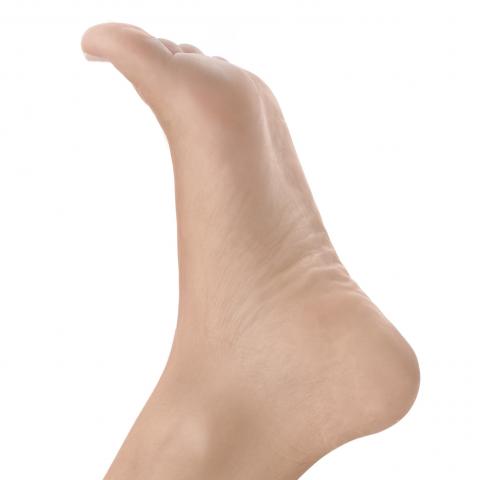
| Word | Meaning | Usage in Sentence |
| Head | Your “head” is above your shoulders. | The doctor scratched his head in thought. |
| Shoulder | Your “shoulder” is between your arm and neck. | Thomas injured his shoulder while skiing. |
| Arm | Your “arm” is a limb to which your hand is attached. | Cathy’s arm fell asleep in the middle of the night. |
| Hand | Your “hand” is attached to your arm. | Sara’s hand cramped from writing too much. |
| Finger | “Fingers” are appendages attached to your hand. | Jane cut one of her fingers while peeling an apple. |
| Leg | Your “leg” is a limb to which your foot is attached. | After hurting his leg, Albert needed to walk using crutches. |
| Foot | Your “foot” is attached to your leg. | The shoe was too tight and hurt his foot. |
| Toe | “Toes” are appendages attached to your feet. | She stretched her toes after taking her shoes off. |
| Chest | Your “chest” is below your neck, and contains your heart. | She put her hand over her chest and felt her heart beating quickly. |
| Abdomen | The “abdomen” is the portion of the body containing the stomach and other digestive organs. | After the huge meal, Andy rubbed his abdomen in satisfaction. |
| Face | Your “face” is at the front of your head, and contains the following things. | She put her face in her hands in shame. |
| Eyes | Your “eyes” are below your forehead, and allow you to see. | Brian told his girlfriend she had pretty eyes. |
| Nose | Your “nose” is below your eyes, and allows you to smell things. | The scent of dinner cooking reached her nose and made her happy. |
| Mouth | Your “mouth” is below your nose, and allows you to ingest food. | Xavier got hit in the mouth with a football. |
| Ear | The “ears” are on the sides of your head, and allow you to hear things. | After listening to the loud music, she heard ringing in her ears. |
9-Time
Alarm clocks, meetings, flight schedules, and store closing times are all examples of when time vies for your attention. This is a topic with many layers, but I’ve done my best to outline the most important time-related nouns in English for you below!
| Word | Meaning | Usage in Sentence | Additional Notes |
| Today | “Today” refers to the current day. | I’m looking forward to eating dinner later today. | |
| Yesterday | “Yesterday” refers to the previous day (the day before today). | I was able to sleep in and relax yesterday. | |
| Tomorrow | “Tomorrow” refers to the next day (the day after today). | Hopefully the weather is still nice and sunny tomorrow. | |
| Day | A “day” refers to a period of twenty-four hours. | This is a pleasant day. | |
| Week | A “week” refers to a seven-day period. | Brandy had to skip school all week because she was sick. | Week is not to be confused with the word “weak,” which means to lack strength. |
| Month | A “month” refers to one-twelfth of a year, consisting of about four weeks or thirty days each. | August is Jennifer’s favorite month. | |
| Year | A “year” refers to twelve months, or the time it takes for the earth to revolve around the sun. | Wendel will be moving away next year. | |
| Hour | An “hour” consists of sixty minutes, and there are twenty-four hours in one day. | Lucy couldn’t wait until the hour was over so she could leave work and go home. | |
| Minute | A “minute” consists of sixty seconds. | He didn’t think he could stand another minute of her lecturing. | Minutes are also used in telling time, along with hours. For example, when someone says that it’s 8:48 am, the “48” means 48 minutes after 8 o’clock. |
| Second | A “second” is a short period of time, sixty of which make up one minute. | One second she was happy, and the next she was crying; what did he do wrong? | Second here is not to be confused with the adjective “second,” which refers to being after the first of something. |
| Calendar | A “calendar” shows the months of a given year, as well as the days in that month. It can be either in tangible paper form and hung on a wall, or an app on a phone or computer. Calendars are used to track what day it is, upcoming dates and holidays, and to help schedule events/appointments. | After checking her calendar, Nel had to cancel her date for next week. | |
| Date | A “date” refers to a specific day, usually consisting of the month, day, and year. | “What’s today’s date?” Joe asked. | Date here is not to be confused with the word’s other two meanings. One meaning is a date, like a romantic time out with someone (as it’s used in the “calendar” example sentence). The other meaning is a type of fruit. |
Days of the Week
Learning about nouns in English language isn’t really complete until you know the days of the week, too!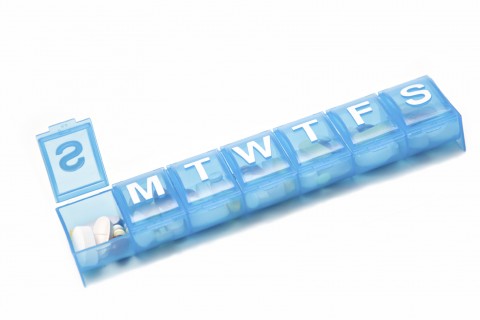
| Word | Meaning | Usage in Sentence |
| Sunday | “Sunday” is the first day of the week, and is the second day of the weekend. | Po went to church on Sunday. |
| Monday | “Monday” is the second day of the week, but the first day of the work week. | Raina didn’t look forward to work on Monday. |
| Tuesday | “Tuesday” is the third day of the week, and the second day of the work week. | Abby looked forward to lunch with her boyfriend on Tuesday. |
| Wednesday | “Wednesday” is the fourth day of the week, and the third day of the work week. | Sil skipped school on Wednesday. |
| Thursday | “Thursday” is the fifth day of the week, and the fourth day of the work week. | “What should I bring to the potluck on Thursday?” she asked. |
| Friday | “Friday” is the sixth day of the week, as well as the fifth and final day of the work week. | Zora worked the late shift at work on Friday night. |
| Saturday | “Saturday” is the seventh day of the week, and the beginning of the weekend. | Fay looked forward to sleeping in on Saturday. |
3. Conclusion: Master Nouns in English & Much More with EnglishClass101!

I hope you enjoyed this English nouns lesson and learned some valuable information about the most common nouns in English with EnglishClass101.com! What did you learn about English nouns? Are there any English nouns you still want to learn about? Let us know in the comments! We always look forward to hearing from you!
Learning about nouns in English language studies can be difficult, but know that with enough practice you’ll get the hang of it!
To continue learning English, explore EnglishClass101.com and take advantage of our fun, practical learning tools! There you can read more insightful blog posts like this one, study free English vocabulary lists, and chat with fellow English learners on our community forums!
With a Premium Plus account, you can also take advantage of our MyTeacher program, and learn English one-on-one with your own teacher and personalized learning plan!
At EnglishClass101, we have learning and study tools for every student’s success. Combine that with your hard work and determination, and you’re sure to master English! You’ll be speaking, reading, and writing English like a natural before you know it!

Celebrating Flag Day in the United States

A flag can say a lot about its country, and each one is steeped in years of history. The United States Flag, adopted in 1777, has undergone many changes over the years as circumstances change and states are added to our nation.
So, why is Flag Day observed in the U.S.? In this article, you’ll learn all about Flag Day’s meaning to U.S. citizens, some facts about the U.S. Flag, and some important vocabulary.
Let’s get started.

1. U.S. Flag Day History and Meaning

What is Flag Day in the U.S.?
Flag Day in the United States is a day of commemoration for the country’s freedom and—even more so—its flag, which was adopted in 1777 by the Second Continental Congress. The adoption of the U.S. Flag signified independence from Great Britain and unity among the different states. Prior to its incorporation, the U.S. Flag looked very much like the British Flag; in addition, the different states had previously fought the British under a variety of different flags. Bernard J. Cigrand is credited as being the person who had the most influence in making Flag Day an official holiday, though there were people before and after him who made the same proposal. In 1916, President Woodrow Wilson took Cigrand’s proposal into consideration and decided to make Flag Day official.Flag Day in the U.S. is a time of commemorating the events leading to the country’s independence and reflecting on what it is to be a United States citizen.
- Do you want more U.S. cultural info? Check out the Top 5 Pop Culture Things/Icons You Need to Know About in the USA!
2. When is Flag Day in the U.S.?
Each year, the United States celebrates Flag Day on June 14.
- By the way, here are the Top 5 Most Important Dates in America.
3. How is Flag Day Celebrated?
While the U.S. National Flag Day is not a public holiday, there are a variety of activities that can take place on this day. On Flag Day, U.S.A. citizens fly the flag at their homes and outside of their business buildings. The country is bright with red, white, and blue wherever you go! Even major roads and streets may be decorated with red, white, and blue streamers or miniature flags.
The National Flag Day Foundation also does a special flag-raising ceremony, in which attendees sing the national anthem (The Star-Spangled Banner) and say the Pledge of Allegiance with their right hand over their heart. There’s usually a Flag Day parade as well.
In Philadelphia, many people visit the Betsy Ross House to celebrate Flag Day. This is the previous home of Betsy Ross, the woman often credited with creating the first U.S. Flag. Another popular location on Flag Day is the Star-Spangled Banner House, which is in Baltimore, Maryland.
- See our list of the Top 10 Tourist Attractions in the United States!
4. Changes to the Flag

Do you know how many times the United States Flag has been changed or altered in some way? Twenty-six!
Betsy Ross’s flag was composed of thirteen red and white stripes in alternating order, and a blue canton in the top left corner containing thirteen stars arranged in a circle. Today, the flag contains thirteen red and white stripes, but now there are fifty stars (one for each state), no longer in a circle.
5. Must-Know Flag Day Vocabulary

Are you ready to review some of the vocabulary words from this article? Here’s a quick list!
- White
- Red
- Blue
- Sing
- Bald eagle
- The national bird of the United States
- Revolutionary War
- The war that allowed the United States to gain its independence from Great Britain
- Flag
- Stars and Stripes
- The United States Flag consists of fifty stars (representing the fifty states) and thirteen stripes (representing the original thirteen English colonies in the U.S.). Stars and Stripes is a nickname of the U.S. Flag.
- Parade
- United States
- Betsy Ross
- The woman credited with creating the first U.S. Flag, in 1870
- Philadelphia
- A large city in the state of Pennsylvania, where the first U.S. Flags were made
- Star-Spangled Banner
- The national anthem of the United States, written by Francis Scott Key in 1812; also a nickname of the U.S. Flag
- Pledge of Allegiance
- A pledge spoken to indicate allegiance (loyalty) to the United States
- Old Glory
- A nickname used for the U.S. Flag
To hear the pronunciation of each word, be sure to visit our U.S. Flag Day vocabulary list!
Final Thoughts
We hope you enjoyed learning about Flag Day in the United States with us, and that you took away some valuable information.
What does your country’s flag look like? Do you have a Flag Day in your country? Let us know in the comments!
If you want to continue learning about U.S. culture and the English language, EnglishClass101.com has some great free resources for you, straight from our blog:
- The Fourth of July: Independence Day in the United States
- Time Off to Vote: Voting and Elections on Election Day
- Proper American Etiquette in the United States
- Life Event Messages in English: Happy Birthday & Much More!
- Finding the Perfect Mad with Anger Sentence in English!
This only scratches the surface of everything we have to offer English-learners. To make the most of your time on EnglishClass101.com, create your free lifetime account today. You can also upgrade to our Premium or Premium PLUS options, which will give you access to exclusive content and lessons.
Happy learning, and stay safe out there!

Learn the Best Compliment Phrases in English
When you compliment someone, you’re doing so much more than offering them kind words. You’re also boosting their confidence, showing them that you’re on their side, and extending a hand of friendship (or strengthening the one you have). A meaningful, well-placed compliment can even change a person’s entire day for the better!
Just about everyone loves compliments, and learning how to offer compliments in someone’s native language will make both of you feel great!
Lucky for you, EnglishClass101.com has prepared a simple guide on the best compliment phrases in English for a variety of situations and people. Once you have these down, you can build off of them and create your own unique compliments for the people in your life!
Let’s learn English compliments together!

Table of Contents
- English Compliments List
- How Do You Make Compliments Sound Sincere?
- What to Expect Afterwards
- Final Thoughts
1. English Compliments List
1- Look & Personality
Many compliments in English are aimed at a person’s appearance or their personality.
Here are some basic sentence structures you can use when giving compliments in English about someone’s looks or personality. These are phrases that you can say to anyone simply by filling in the blanks with the appropriate words for the situation.
| Compliment | Notes | Example Situation |
|---|---|---|
| “I love your ___!” | Here, you can fill in the blank with something about the person that you love.
This can be an article of clothing, a personality trait, or even a haircut. |
You run into someone you know at the grocery store and notice they recently got their hair cut or styled.
You greet them and say “I love your haircut!” |
| “Your ___ is/are so ___.” | Here, you can fill in the first blank with the thing or trait you’re commenting on.
In the second blank, you put an adjective to describe that thing or trait. |
A female friend picks you up to spend the day together. You notice that she recently had her nails done.
You comment by saying “Your nails are so pretty.” |
| “That/Those ___ is/are really ___.” | This is the same as the compliment directly above. You meet with a friend who’s wearing a pair of cool-/cute-looking shoes you haven’t seen them wear before. |
You compliment their shoes by saying “Those shoes are really cute/cool.” |
| “I like ___” | Here, you put the object or trait that you like in the blank. | A colleague you know well comes into the office wearing a new shirt.
You compliment their shirt by saying “I like the shirt you’re wearing.” |
| “Is that a new ___? I like it.” | Here, you put what you’re commenting on in the blank. This phrase is normally used for clothing, other objects, or changes in appearance.
When you use this compliment, it shows that you really pay attention to that person and what they own/wear. |
You’re spending time with a close friend and suddenly notice they’re wearing a new jacket.
You say “Is that a new jacket? I like it.” |
| “You’re so ___.” | Use this phrase to compliment someone on a personality trait you admire in them. | Someone gives you a compliment, so you smile and say “You’re so sweet!” |
A- English Compliments to a Woman
If you’re trying to win a woman’s heart, here are some compliments you can say to her. Generally, these are best used on a date or other romantic occasion.
| Compliment | Notes | Example Situation |
|---|---|---|
| “You have a beautiful smile.” | You say something that makes your date laugh, and you tell her “You have a beautiful smile.” | |
| “You look lovely.” | You’re picking up your date, who’s dressed up, and you tell her “You look lovely.” | |
| “Has anyone told you how beautiful you are?” | Many women love to be complimented in the form of a question, especially in a romantic context like a date. | You’re on a date with a woman you think is very beautiful, and you say this to her. |
| “You have a kind heart.” | You see a woman you like do something nice for someone, so you say this to her the next chance you get. | |
| “You’re beautiful inside and out.” | By telling a woman she’s beautiful inside and out, you’re saying that both her appearance and personality are beautiful to you. | When you’ve been in a relationship with a woman for a little while, you can say this to her to brighten her day. |
B- English Compliments to a Man
Is there a man who’s caught your eye or your heart? Here are a few compliments you can give him. These are best used on a date or other romantic occasion.
| Compliment | Notes | Example Situation |
|---|---|---|
| “You’re very handsome.” | You happen to see a man you like dressed up nicely, so you say this to him. | |
| “How charming you are!” | You’re on a date with a man, and he says something cute or funny, so you tell him this. | |
| “You’re very strong.” | This can mean either physically, mentally, or emotionally. | A man you like is helping you carry something heavy. To compliment him, you can say “You’re very strong.” |
| “There aren’t many men like you.” | This phrase implies that you think this man is one-of-a-kind and better than most other men. | When you’ve been in a relationship with a man for a while, you can tell him this to brighten his day and show your appreciation. |
| “You’re a good man.” | You can tell this to a man who you think is a good person. |
Do you need to brush up on your English vocabulary? You may want to check out the following vocabulary lists on EnglishClass101:
- Clothes
- Clothing Accessories
- Personality
- 50 Most Common Adjectives
- Common Phrases You’ll Need for a Date
2- Work
Giving someone a compliment on a job well done or overall good work performance can really make their day and encourage future success. Depending on how well you know the coworker (or employee), you may want to give a more general compliment or one that’s more specific and detailed.
Here are a few typical English compliments for the workplace!
A- General
| Compliment | Example Situation | Notes |
|---|---|---|
| “Good job.” “Well done.” “Nice work.” “Nicely done.” “You did great.” |
A colleague you know well receives a high performance rating on a big project.
After they tell you about it, you say one of these phrases to congratulate them. |
All of these phrases are interchangeable. They are simple ways of congratulating someone on a job well done.
In informal situations, such as spending time with close friends, all of these phrases can also be used sarcastically. This is usually done when you or another member of the group does something clumsily or not very well. However, in formal situations, these are used as genuine compliments. |
B- Specific
| Compliment | Example Situation | Notes |
|---|---|---|
| “You gave a really good presentation.” | One of your colleagues had given an important presentation earlier, and you thought they did really well.
After work, you make sure to tell them “You gave a really good presentation.” |
|
| “That’s a great idea.” | You’re stuck on a task that seems impossible, and your partner for the project suggests something that may help.
Relieved, you tell them “That’s a great idea. (Thank you.)” |
|
| “You did really well (on) ___.” | A colleague just got finished redesigning your company’s website.
Impressed, you tell them “You did really well redesigning the website.” |
Here, you can fill in the blank with whatever thing that person did well on. |
| “I appreciate your work on this.” | One of your employees did a really good job on a difficult task you assigned them.
To let them know you’re impressed and that you took notice of their work, you say “I appreciate your work on this.” |
|
| “The way you ___ was amazing.” | A colleague did a great job working with a difficult client earlier that day.
To show them you’re impressed, you say “The way you handled that client was amazing.” |
Here, you can fill in the blank with whatever task/assignment/action this person did that you thought was amazing. |
Do you need more words for the office or talking about your job? Check out the following vocabulary lists on EnglishClass101:
3- Skills

Some of the best English compliments you can give someone are those about their skills. If you notice that someone does really well at something, go ahead and let them know!
| Compliments | Example Situation | Notes |
|---|---|---|
| “Great job out there!” | Your friend invited you to a tennis tournament they’re competing in.
After the event, you meet up with your friend and tell them “Great job out there!” to show you were impressed with their skills. |
|
| “Are you sure you’re not a professional?” | Your friend does photography as a hobby and offered to take your wedding photos.
After you see how good the photos are, you say “Are you sure you’re not a professional?” |
This is a fun, informal way of letting someone know how highly you think of their skill or ability in something. |
| “Wow, I’m impressed!” | You attend a play that your friend is acting in, and they did a remarkable job.
After the play, you tell them “Wow, I’m impressed!” |
| Compliments | Notes | Example Situation |
|---|---|---|
| “You’re good at ___.” | Here, fill in the blank with the skill or activity you’re commenting on.
You can also add the modifiers “really” or “very” to show that they’re better than good. 😉 |
You’re at a friend’s house and they play their guitar for you.
They did well, so you say “You’re (really) good at playing the guitar.” |
| “You’re a great ___.” | Here, fill in the blank with the name of the hobby, profession, or other activity you’re commenting on. | You see a friend’s painting that they’ve been working on for weeks.
It looks very cool, so you tell them “You’re a great painter.” |
| “You ___ beautifully.” | Here, fill in the blank with the skill or activity the person does beautifully.
Use this phrase if you really want to see that person smile. This compliment tends to mean a lot to someone. |
You hear someone you know singing and think they sing very well.
When you get the chance, you tell them “You sing beautifully.” |
| “You’re such a good ___.” | Here, fill in the blank with the name of that person’s profession, hobby, or role. | In debate class, you find yourself impressed with a classmate’s speaking abilities.
After class, you tell them “You’re such a good speaker/orator.” |
| “You’re a ___ [adjective] ___ [skill/hobby/profession].” | This one is a little more complicated.
In the first blank, fill in a positive adjective that describes their skill, hobby, or profession. In the second blank, put the name of their skill, hobby, or profession. |
1. “You’re a talented writer.”
2. “You’re a wonderful soccer player.” 3. “You’re a skilled origamist.” |
| Compliments | Example Situation | Notes | |
|---|---|---|---|
| Cooking | “This is a really good meal.”
“Wow, can I have the recipe?” “Thank you for this wonderful meal.” |
You’ve just finished eating dinner at a friend’s house.
To compliment their cooking, you say one of these phrases. |
|
| Photography | “Those are beautiful pictures.”
“You’re so good at photography.” “You’re great with a camera.” |
A friend shows you some photographs they’ve taken recently.
You’re impressed, so you say one of these phrases to them. |
|
| Drawing | “Your drawing is really cool/pretty.”
“I really like your drawing.” “I wish I could draw as well as you.” |
You happen to look over to your classmate’s desk and notice them drawing.
You think it’s a great drawing, so you tell them one of these phrases. |
|
| Writing | “Your writing is very good.”
“I like reading what you write.” “You should write a book!” |
A friend was kind enough to show you something they wrote.
You think it’s really good, so you tell them one of these phrases. |
|
| Singing | “I’m so jealous of your singing voice!”
“Your singing voice is very pretty.” “Where did you learn to sing like that?” |
You and some friends have a karaoke night, and you’re surprised when one of them is a very good singer.
To compliment them, you say one of these phrases. |
|
| Sports | “You did really well in your ___ game.”
“It was fun watching you play.” “You could be in the ___!” |
You watched a sports game that someone you know played in.
You thought they did well, so you tell them one of these phrases. |
In the first phrase, you can replace the blank with whatever game they were playing. (Ex. “soccer game.” )
In the final phrase, you can replace the blank with a sports team or organization related to the sport they were playing. It means that they’re good enough to play professionally. (Ex. “in the NFL!” ) |
| Games | “You’re a wonderful ___ player.”
“You always beat me at ___.” “One of these days I’ll win.” |
You’ve just finished playing a game with a new acquaintance and they won.
You’re impressed, so you tell them one of these phrases. |
In the first phrase, you can replace the blank with whatever game you were playing. (Ex. “Backgammon player.” )
In the second phrase, you can replace the blank with whatever game you were playing. (Ex. “at Monopoly.” ) |
There are so many things you can compliment someone on regarding their skills! If you need to brush up on your vocabulary for these topics, EnglishClass101 has the following vocabulary lists:
4- Bonus: Very American Compliments
Now, here are some English slang compliments that Americans love to use, especially on social media. Don’t be surprised if you hear some of these in person, too!
| Compliment | Notes | Example Situation |
|---|---|---|
| “You’re the real MVP.” | This is a popular phrase in the United States, rising to fame as a meme featuring Kevin Durant.
It means that you’re the “most valuable player,” which is a title awarded to sports players. It can be used as a genuine compliment but is almost always said ironically and humorously. |
You pick up a piece of litter off the ground and throw it away.
Someone you know sees and says “You’re the real MVP.” |
| “You’re on fire.” / “You’re on a roll.” | This means that someone is continuously doing very well at something. | You’re about to beat your high score in a video game. Your best friend says, “You’re on a roll!” to encourage and compliment you. |
| “Why/how are you so ___ ?” | Fill in the blank with either a positive adjective or a clause to finish the thought. | A coworker walks by your desk and notices that it’s very clean. They say “How are you so organized?” as a compliment. |
| “You’re on your A-game.” | This means that someone is doing something to the very best of their ability. | You’ve passed three exams in a row. Your friend in class notices, and says “You’re on your A-game!” |
| “You’re a doll.” | This means that someone is being very kind, sweet, or cute. It’s typically said between two female friends. | Your female friend invites you to her house for lunch. You bake cookies before coming over and bring them with you.
When your friend sees the cookies, she tells you “Thank you. You’re a doll!” |
2. How Do You Make Compliments Sound Sincere?
When you give a compliment in English, the last thing you want to do is sound insincere or fake. Americans tend to be very sensitive to this and might form a negative opinion of you if they think you’re not being sincere with your compliments.
When you pay someone a compliment in English, there are a few things you can do and be mindful of to sound more sincere.
- Avoid complimenting too much or too often.
If you’re always giving people compliments, those people will become less likely to believe that you’re sincere. Be sure to only compliment when you mean it, and even then, don’t compliment every time you feel like it. In general, you should save your compliments for times and situations that matter.
- Don’t overdo your compliment.
When giving compliments in English, don’t overdo it. Just as you shouldn’t compliment too often, you also shouldn’t put too much in your compliment.
Avoid using words like “fantastic,” “spectacular,” and “wonderful,” unless you really, really mean it. Don’t make your compliment overly wordy, and don’t keep going on and on about it.
- Make sure your compliment is relevant.
If you comment on something that has nothing to do with the current situation, people may not take the compliment seriously (or will be confused by it).
For example, if you’re playing a video game with a friend, it’s probably not the right time to compliment them on their new haircut or guitar skills.
Sometimes, if you’ve just met someone for the first time, it may be appropriate to offer an off-handed compliment about their appearance or something good you’ve heard about them.
- Comment on details.
You can skip this tip if your English isn’t very good yet. Basic compliments will still make someone’s day. But if you feel confident enough, people love to hear the little details about why you’ve complimented them.
Being able to comment on details shows that you’re really paying attention to them and mean what you’re saying.
For example, instead of just saying “I love your haircut,” you can say “I love your haircut. It really frames your face well.” Instead of saying “You’re good at playing the guitar,” you can say “You’re good at playing the guitar. It sounds very smooth and natural.”
- Look them in the eyes.
Generally, in the United States, people prefer eye contact when speaking with each other. This is especially true when talking about a serious topic or letting someone know you’re being honest with them.
Appropriate eye contact for Americans is something that will become more natural to you as you continue speaking with people.
For more information on body language in the United States, you can check out my article on Body Language!
3. What to Expect Afterwards
In the United States, people have different reactions to compliments depending on a variety of factors.
1. Situation/Setting: Work or social? Friend or stranger? In public or in private?
2. Who’s giving the compliment: How well do they know you, and in what context?
3. What the compliment is about: Was your compliment sincere? Is it something they’re comfortable being complimented on?
In general, Americans will gladly receive compliments with a “thank you.” A lot of the time, they’ll also give you a compliment in return. This can be about either the same thing or something else:
A: “I like your shirt.”
B: “Thank you! I like yours too.” OR “Thank you! I really like your shoes by the way.”
Some people may try to deflect the compliment if they feel uncomfortable, embarrassed, or not worthy of the compliment:
A: “That was a great presentation!”
B: “Thanks, I thought I could have done better though.” OR “You thought so? I could have done better.”
In the event that this happens, don’t worry too much. They probably do appreciate the compliment, but it’s best not to push it on them.
4. Final Thoughts
As long as you’re sincere in your compliments and don’t hand them out too freely, especially around people you see all the time, Americans tend to love being complimented—and giving compliments in return.
Do you feel more comfortable giving the most common compliments in English now? What are some common compliments in your own language? We look forward to hearing from you!
Once you’re more confident in your English-speaking abilities, don’t be afraid to experiment a little. You can use the same sentence patterns and basic phrases we went over in this article to create your own compliments in English. While any compliment can make someone smile, a more unique one will warm their hearts.
And remember that EnglishClass101.com will be here to help and guide you as you continue delving into the English language! Create your free lifetime account today, and learn English like never before!
Happy English learning!

Finding the Perfect Mad with Anger Sentence in English!
We all have bad days, and we all have at least the occasional wave of anger toward someone or something. Expressing your emotions is healthy, and this is certainly as true for anger as it is for any other emotion. While yelling or screaming things in your own language, kicking walls, slamming doors, and stalking off irritated can help you reduce anger, nothing beats communicating your anger with someone in words they understand.
The word “anger” in English refers to a negative feeling of frustration, disappointment, or even rage. In this article, we’ll answer the question “How can I express my anger in English?” and teach you some of the most commonly used angry English expressions.
By learning angry phrases in English, you will have a whole arsenal of things to tell people in the U.S. when you’re angry. Expressing anger in English can open doors to communication. And sometimes it just feels good. (But, of course, at some point you’ll need to cool down—for some tips and advice, scroll to the bottom of this article.)
Are you ready? Here’s EnglishClass101’s guide to getting angry in English, complete with many mad with anger sentences in English!

Table of Contents
- Angry Imperatives
- Angry Warnings
- Angry Blames
- Describing How You Feel
- Bonus: How to Calm Yourself Down When You’re Angry
- How EnglishClass101 Can Help You Express Yourself in English
1. Angry Imperatives
You use an angry imperative when you want to tell someone what to do. The angry English phrases below are useful for communicating when someone needs to stop what they’re doing!
1- Shut up!
Meaning:
When you tell someone to “shut up,” you’re demanding that they stop talking. Essentially, it’s like telling someone to shut their mouth (which, interestingly, is another common angry sentence in English).
Example:
A mother and her teenage son get into a big fight; one of them says something the other doesn’t like, so they yell “Shut up!”
Additional Notes:
While this is traditionally an “angry” phrase, it’s also used in two other contexts:
1) Jokingly telling someone to shut up (like if one best friend is teasing another)
2) Sometimes this phrase is said when someone is saying something good, though this is less common. For example, if someone tells you they’re taking you to Disneyland for your birthday, you might say “Shut up!” in excitement or disbelief.
2- Stop it.
Meaning:
Use this phrase to tell someone to quit doing whatever they’re doing. (And you mean now!)
Example:
Your family continually teases you about something, and you can’t take it anymore so you yell “Stop it!”
Additional Notes:
Like the phrase above, this phrase is occasionally used in a joking manner, like between friends. That said, if someone says this to you and you’re not quite sure if they’re serious or not, it’s better to be on the safe side and stop.
3- Cut it out!
Meaning:
This phrase means exactly the same thing as “stop it” but is generally less serious.
Example:
A parent might use this angry phrase with his or her children to get them to calm down or stop behaving inappropriately.
Additional Notes:
Can be used jokingly or in mild situations.
4- Leave me alone.
Meaning:
Sometimes, you just need to be by yourself while you calm down and collect yourself. This phrase tells someone to let you do that (with the implication that you’ll be even angrier if they don’t leave you alone).
Example:
You and your significant other get in a big fight, and out of desperation to be alone and temporarily stop the fighting, you say “leave me alone.”
Additional Notes:
While the other phrases in this section are often used jokingly, this phrase tends to be more serious and is less frequently used jokingly. If someone says this to you, it’s best to “give them some space” (leave them alone).
5- Get lost.
Meaning:
When you tell someone to “get lost,” it’s the same as telling them to leave you alone or go away. This tends to be a more derogatory way of saying “leave you alone,” and implies that not only do you want them to go away, but you also don’t really care where they go. You’re so angry you just want them gone.
Example:
You’re fighting with a close friend or family member about something serious, and then you tell them to “get lost.” Because this person is close to you, these words are meant to hurt them and show your anger by implying that you don’t care where they go.
Additional Notes:
From time to time, this phrase can be used jokingly or lovingly, but not very often.
2. Angry Warnings
When you feel anger beginning to bubble up inside you, or when someone’s about to cross a serious line, it’s only fair to give them a warning. Use the English angry phrases below to let someone know you’re getting angry with them.
1- Don’t mess with me.
Meaning:
Say this to someone if they’re starting to make you angry, especially if they’re saying mean things or trying to physically hurt you. This is meant to warn them that if they don’t stop, you’re going to fight back.
Example:
You’re at school and another student comes up to you and starts making fun of you or is bothering you in general. You could say, “Don’t mess with me,” as a warning that they need to stop.
2- You’re asking for trouble.
Meaning:
This is similar to the phrase above. It means that if the other person won’t leave you alone or stop what they’re doing, you’re going to fight back.
Example:
Someone living in your apartment complex tries to start a fight with you. You could tell them “You’re asking for trouble,” as a warning that if they start a fight, you’ll fight back and win.
Additional Notes:
I don’t recommend using this angry sentence in English very often, if at all. It’s best used when you feel like you’re in some kind of danger and want the other party to back off and leave you alone.
3- Okay, you asked for it!
Meaning:
Use this phrase if the other party didn’t heed your earlier warnings. This phrase is warning them that because they didn’t listen before, you’re going to fight back.
Example:
The person at your apartment who tried to start a fight didn’t back down, so now you’d say, “Okay, you asked for it!”
4- Don’t make me say it again.
Meaning:
This angry phrase is often used between two people who are close: family members, close friends, or significant others. On occasion, it may be used by a teacher to a student (or an entire classroom).
When you say this phrase, it means that you’ve already told the person to stop doing something and they didn’t listen. This phrase implies that if you have to tell them again, you’ll be so angry that they’d better watch out!
Example:
You’re renting an apartment with a friend, and they haven’t been paying the full amount they owe. You’ve been telling them for months that they have to start paying more, but they won’t listen. During an argument over the rent money, you say “Don’t make me say it again!”
This phrase is often followed by the words “or else…,” which means that there will be a negative consequence if they don’t listen (e.g. your friend can’t live with you anymore).
5- This is my last warning.
Meaning:
This is a very classic phrase that children growing up in the U.S. often hear from their parents. It’s very similar to the phrase above, but it implies even further that there will be negative consequences if they don’t listen.
Example:
A mother has repeatedly told her young child not to run in the house. Finally, after the thirteenth time, she pulls him aside and says, “No more running through the house. This is my last warning.”
6- I don’t want to see you again.
Meaning:
Use this phrase when someone very close to you has done something to hurt you. It means that you’re so hurt and angry by what they did or said that you hope to never see them again. Sometimes, it can be used as a cue for them to leave.
Example:
You significant other did something that really hurt you or made you angry. So you tell them “I don’t want to see you again!”
7- I will not tolerate that.
Meaning:
This phrase is most commonly used by teachers to their students (or whole classrooms) and by parents to their children. It can also be used between friends and significant others.
When you use this phrase, it means that someone crossed a line or did something they really shouldn’t have done. Saying this indicates that if it happens again, there will be very negative consequences.
Example:
A student starts saying bad things to a teacher or is severely misbehaving in class. The teacher pulls the student aside and says “I will not tolerate that!”
8- How many times do I have to tell you?
Meaning:
This phrase is similar in meaning to “Don’t make me say it again” but is actually less angry and more frustrated. It means that you’re very disappointed and frustrated with someone for not listening to you or doing what you want them to do.
You can use this phrase in a wide variety of situations and across different relationship barriers (e.g. you can use this phrase equally toward a significant other, a co-worker, or your child).
Example:
Your friend has been bothering you all week to go to an event with them the following weekend. You keep telling them no, but they keep insisting. Finally, you’re so annoyed with them that you say “How many times do I have to tell you? I don’t want to go.”
9- You’re getting on my last nerve.
Meaning:
When you use this phrase, it means that someone is getting very close to making you angry (or angrier).
Example:
A family member just won’t leave you alone about something. You’re getting really annoyed with them, so you say “You’re getting on my last nerve,” to warn them that they should stop.
Additional Notes:
Sometimes, you may hear something along the lines of “You’re pushing my buttons.” This phrase may sound odd, but it really just means the same thing as “You’re getting on my last nerve.”
10- I’ve had enough.
Meaning:
This is both an angry phrase and a phrase of defeat. It means that you’re both very angry and weary of fighting or arguing and you just want it to stop. This phrase is often said in an assertive tone and means something similar to “stop it.”
Example:
You and your co-workers are arguing about something at work, and you’re really stressed out. You’re frustrated and angry that your co-workers won’t listen to you so you finally say “I’ve had enough,” and leave the room if possible.
3. Angry Blames
Oftentimes, a person’s first reaction to a stressful situation or something that angers them is to blame someone. Use the phrases below to express your disappointment toward someone’s words or actions and to show that you’re angry at them for something that happened. Note that many of these are angry questions in English, and don’t really require an answer.
1- What were you thinking?
Meaning:
Use this phrase when someone does something really stupid or something that makes you angry. It implies that they must not have been thinking clearly to do something as terrible as they did.
Example:
A father finds out that his daughter snuck out of the house a few nights ago. He approaches her about it and asks, “What were you thinking?”
2- Who do you think you are?
Meaning:
This phrase implies that you don’t like the attitude of the person you’re angry with. Say this to someone if you think they’re acting too prideful or rude, and it’s making you angry.
Example:
You’re standing in line at a restaurant and someone cuts in front of you. You’re already having a bad day, so you tell them “Who do you think you are?”
3- Are you out of your mind?
Meaning:
This phrase is very similar to “What were you thinking?” but is generally used in more serious situations, or when the person did something terrible.
Example:
You and one of your friends get into a big argument, and they grab your cell phone and throw it across the room. You immediately ask them, “Are you out of your mind?”
4- What’s wrong with you?
Meaning:
This is similar to “What were you thinking?” and “Are you out of your mind?” When you say this phrase to someone, it implies that you think the only way they could be acting the way they are is if there’s something wrong with them.
Example:
You’ve just told someone not to do something, and they did it just to make you angry. You say “What’s wrong with you?”
Additional Notes:
You may sometimes hear the phrases “You’re sick,” “You’re messed up,” or “You’re crazy,” especially on television. These all mean practically the same thing.
5- You aren’t listening to me.
Meaning:
This blame phrase indicates that the person you’re angry with isn’t paying attention to what you’re saying, especially in the middle of an argument.
Example:
You and your spouse get into an argument about something, and you keep trying to explain something to them, but they interrupt you every time you start talking. You could say “You aren’t listening to me,” to call them out on it or to just end the discussion.
6- It’s all your fault.
Meaning:
This is the most classic of angry blame phrases in English. It literally means that whatever negative thing happened is entirely the other person’s fault.
Example:
Your friend kept you awake all night so you couldn’t study, and then you failed the test the next day. The next time you see them, you could say “I failed the test. And it’s all your fault.”
7- You messed everything up.
Meaning:
This is similar to “It’s all your fault.” Oftentimes, this is used when someone blames another person for something bad that happened (especially if things were planned to go a certain way but didn’t).
Example:
You’ve been working on a huge project for weeks, and a family member accidentally deletes all the files from your laptop the day before it’s due. You tell them “You messed everything up!”
8- You’re impossible.
Meaning:
When you tell someone “You’re impossible,” it means that you’re frustrated with them about their attitude, an action they did, or something they said. Essentially, it’s “impossible” to deal with them or be around them without becoming angry or frustrated.
Example:
You’re having an argument about something with a family member, and they keep interrupting you when you try to talk. Finally, out of frustration, you yell “You’re impossible!” and walk away from the conversation.
Additional Notes:
Oftentimes, close friends and family members will say this to each other jokingly out of mild frustration. This angry blame has the exact same meaning but is said in a more light-hearted manner.
9- It’s none of your business.
Meaning:
Use this phrase when someone tries to interfere with your life in a way that’s not welcome. This phrase basically means that whatever is going on in your life, or how you live it, isn’t for them to interfere with.
Example:
You’re mother sets you up on a date with someone without telling you. When you ask her why she would do it, she says “I thought you needed a boyfriend/girlfriend.” You then roll your eyes and say “It’s none of your business!”
10- I can’t believe you.
Meaning:
This phrase is similar to “You’re impossible.” It basically means that you’re angry or in shock about something someone did or said. It seems impossible to you that they could have done or said it.
Example:
Your sibling spilled orange juice all over your homework assignment. Your turn to them and say “I can’t believe you! You ruined my homework!”
11- How could you do this?
Meaning:
Use this phrase when someone does something that really hurts you, especially when you feel betrayed by them. It’s basically asking them how they could be so inconsiderate, or even wicked, to have done that thing (especially behind your back).
Example:
Someone finds out their spouse or significant other has been unfaithful to them. They ask them “How could you do this?”
12- You’re blaming me?
Meaning:
People often use this phrase when someone tries to put the blame on them for something that’s (arguably) the other person’s fault. It’s sort of a rhetorical question about who the blame should really be on.
Example:
You wait outside your friend’s house at an agreed upon time to take them to the airport, and they take a very long time getting ready. On the way there, you get stuck in heavy traffic and they miss their flight.
Your friend says, “I can’t believe you made me miss my flight!” You reply “You’re blaming me? You should have been ready sooner.”
4. Describing How You Feel
Once the yelling, fighting, and blaming has come to an end, it’s important to try and express how you really feel (and why). This may not be the best time for a conversation, but using one of the phrases below can help you open the door for one later.
1- I’m ready to talk.
Meaning:
Oftentimes, this phrase is used after taking some time alone following an argument. It indicates that you’re angry about something, and that you’re finally ready and comfortable to talk about it rationally with that person.
Example:
You and your spouse had a fight, and you left the house for a while to cool down. When you come back home, you find them and say “I’m ready to talk.”
2- I’m very upset.
Meaning:
Use this phrase to let the other party know that you’re feeling upset or angry. Oftentimes, just stating this fact is enough to open up the conversation.
Example:
You find out that your child has been lying to you. While talking with them about it, you say “I’m very upset.”
Additional Notes:
This phrase is often used as the beginning of a longer sentence: “I’m very upset about ___,” or “I’m very upset that ___.”
So, in the example situation, you could also say “I’m very upset that you lied to me.” This makes the source of your anger or frustration clearer to the person you’re talking with.
3- I’m fed up with it.
Meaning:
This phrase may sound a little strange, but it essentially means that you’ve had enough of something and you can’t take any more (like when you’re full and don’t want to be fed anymore food). Use this phrase when you’re tired of someone’s attitude or behavior, or even during a situation.
Example:
A family member has been getting on your nerves all day, and you finally tell them “I’m fed up with it!”
4- I hate it/you.
Meaning:
This is one of the strongest phrases on this list, because hate is such a potent emotion. When you say this, it means that you hate the situation (it) or the person you’re talking to (you).
Example:
A child is arguing with her mother, and the fight becomes heated. Finally, the child says “I hate you!” and runs out of the room.
Additional Notes:
In the United States, people use the phrase “I hate you” as a joke all the time, especially when someone has caused them a minor inconvenience that they can both laugh about. You can usually tell whether it’s a joke or not based on the context, but I don’t recommend joking about this very often (just to be safe).
5- I’ve never been so disappointed.
Meaning:
Say this phrase when you want someone to know that they’ve really upset you this time. When you say this phrase, it means that this person has disappointed you more than you’ve ever been disappointed before.
Example:
A close friend recently did something to hurt you. While venting about it to someone else, you say “I’ve never been so disappointed.”
6- You make me so angry.
Meaning:
This is a very clear, to-the-point angry phrase. You’re simply letting the other person know that they make you angry. This is a great phrase to use if you don’t want to worry too much about elaborating and just want to get to the point.
Example:
Your significant other does something that irritates you again. You tell them “You make me so angry!”
7- I can’t handle this anymore/right now.
Meaning:
Use this phrase to let someone know that you’re done and overwhelmed with them (or the situation).
Example:
You’ve been having a rough day, and at the end of the day you get home to some family drama. You tell everyone “I can’t handle this right now,” and go to your room.
8- I wish ___.
Meaning:
Use this phrase to communicate with someone what you want from them or how you wish things were.
Example:
A few common ways to finish this sentence include:
- “I wish you would listen to me!”
- “I wish you would stop doing that!”
- “I wish you would leave me alone.”
- “I wish you weren’t so ___ [negative adjective].”
- “I wish none of this had happened.”
5. Bonus: How to Calm Yourself Down When You’re Angry
Letting out your anger every once in a while is vital to maintaining healthy relationships. But so is learning how to cool down and get in control of how you’re feeling (and how you respond to your emotions). While this is a life-long task, and something that requires constant thought and practice, there are a few things you can do to put yourself in a better frame of mind after getting angry:
- Take a few deep breaths: Don’t roll your eyes at me. Taking some deep breaths can be a way to slow down your heartbeat and your thoughts; doing this can help you see things more clearly and rationally.
- Exercise: Whether you exercise on a regular basis or not, doing some kind of physical activity may help you feel better. Exercise releases endorphins, which are chemicals that put you in a better mood (even if you don’t enjoy exercising itself). I personally find taking a long walk very helpful, but running, lifting weights, or even cooking a meal, can help.
- Listen to music: Listening to music is a common way of understanding and releasing one’s emotions in a healthy way. Whether you prefer listening to angry music to fully experience your negative emotions, or you prefer listening to something calm to help you cool down faster, this can be an effective way to get yourself back on track.
- Write something: For some people, writing is an excellent form of release. You can write a page or two in your journal about why you’re angry, work on a story or writing assignment, or even write an angry letter to someone (that you won’t give them). Putting your thoughts into words on the page or screen can help you process your feelings more easily. Wondering how to express your anger in writing? Check out this fascinating, honest article on the topic.
- Take a nap: We all know how grouchy we can get when we’re tired or sleepy. If possible, lie down in your room and take a nap. Oftentimes, just a few minutes of sleep can help us think more clearly and rationally. If you’re too angry to sleep, just lie down and try to relax.
- Walk in the other person’s shoes: When you “walk in someone else’s shoes,” you try to look at things from their perspective. You need to ask yourself what the other party may be thinking and feeling, and why they think or feel that way. Then, you examine yourself and your behavior in light of what you discovered about the other party. Did they think you were being irrational? Why? This is a fantastic way to gain insight, and can help you dissolve issues more effectively in the long run (even if it’s difficult sometimes to consider the other person’s thoughts and feelings).
- Think to yourself some calming mantras: A “mantra” is sort of like a motto or phrase and is usually said or thought of in order to create a calmer or more inspired mindset. For example, you can think to yourself something simple like “Calm down” or “Everything will be okay.”
- Distance yourself: Sometimes spending some time alone, or just getting away from the person or situation that’s making you angry, is the best thing you can do. Whether you go to your room and close the door, go for a walk or run, or spend some time at the mall or a cafe, having that distance can help you cool down and think more clearly.
Once you’ve had some time to cool down, it’s time to reconcile. If you’ve left a conversation, argument, or situation unfinished, it’s usually best to go back and finish it. Hopefully, the other party (or parties) has also taken some time to calm down so you can both have a much more rational discussion if one is required.
6. How EnglishClass101 Can Help You Express Yourself in English
By now, you should have plenty of angry phrases to get you through your toughest days. While it’s usually best to hold your tongue in times of great anger, letting it out is healthy and important from time to time. And sometimes the other person’s just asking for it…
Self-expression is a vital aspect of being human, and being able to do so effectively is essential for maintaining healthy relationships, both with others and with yourself. If you want to continue learning how to express yourself in English, EnglishClass101.com has various learning tools and vocabulary lists dedicated to this (including an anger vocabulary list in English). Knowing how to describe your anger in English is just one aspect of the bigger picture:
- 10 Lines You Need for Introducing Yourself
- Top 20 Words for Positive Emotions
- Phrases to Express Your Fears
- Top 20 Words You’ll Need for the Internet
- Common Ways to Say Sorry
Know that your determination to learn English, and all the time and effort you’re putting into it, will pay off. Not every aspect of this language-learning journey is easy, but EnglishClass101.com hopes to make every lesson as fun and effective as possible!
Keep up the diligent work and know that one day, you’ll be speaking, writing, and reading English like a native! You can do this. 🙂
Before you go, let us know in the comments what your favorite angry sentence in English is! What are the most common angry phrases in your native language, and what do they mean? We look forward to hearing from you!

















